#is this what they meant by connecting with the character in order to portray them
Explore tagged Tumblr posts
Text
the true dark urge fan experience is coming across the most Fun and Silly (words used very liberally) photos when trying to find a reference for what someone looks like with a healed hole in their head
#is this what they meant by connecting with the character in order to portray them#“oh so that's what they were getting off to!! i guess!!#well if i'm going into fucking biology i better to get used to this#the dark urge#durge#bg3#cw gore#i think#better safe than sorry
11 notes
·
View notes
Text
let’s talk about franziska and grief in justice for all.
the narrative that the games, at first glance, appear to be pushing is that franziska is aware edgeworth has not committed suicide. she repeatedly affirms this, most notably in turnabout bigtop, when she tells phoenix that she believes her brother to be alive and hiding somewhere. however, one thing we need to keep in mind is that franziska and edgeworth were not shown to be close in the interim between jfa and the prequel cases in aai — in fact, it would go against both their characters and the writing of their relationship for them to have kept in much contact at all.
franziska is, if anything, rooted in the past. her hair is cut almost boyishly short and choppy. she carries around a whip because she is so used to being spoken over and ignored, having started her career so young. her youth underlies her every professional achievement; and if not her youth, then her lineage. her physical design is meant to reflect the uniform of a jockey, and taking her aristocratic surname into account, it makes sense: horseback riding, obsessive as it is, remains a pastime for the social class she inhabits. it’s only logical that, in the absence of a real connection with her brother, she would base her understanding of his character on the most recent version of him that she knows, being the vain and easily affronted rookie prosecutor wracked between ambition and guilt that she grew up with. she has no way to know how to fill in the gaps between a suicide note and the brother she knew, because to her, there is no gap to fill in; it seems a logical conclusion to her brother's story and life that he would rather run away than face his own failures. it is consistent with the younger version of edgeworth that we see in trials and tribulations. it is difficult to reconcile that individual with someone who might actually take his own life, at least outwardly speaking. franziska has no hands-on knowledge of her brother and his mental state beyond what she might have seen in the press or heard filtered down from her father. it’s only natural that she draws the conclusion that he simply turned tail and ran away in order to preserve his dignity. it is an obvious conclusion to make.
however, this interpretation completely overlooks the fact that franziska is not stupid. she is well aware that her brother had very recently been 'betrayed' by the man to whose standards he strived to rise to almost his entire life and is aware that the driving force behind this desperation to prove himself was his father's murder. manfred von karma was their father; there is a tendency in both the games and their surrounding fanbase to portray the senior von karma as being nothing more than a teacher and mentor, but if we examine the (limited) dialogue the three share in aai, edgeworth and franziska address von karma as one might a particularly volatile and austere parental figure, and he responds in kind. he employs and underlines a pattern of the same types of verbal abuse and neglect present in many fictional case studies of the paternal abuser; to edgeworth, he shows the former and to franziska, often the latter (what comes to mind is a piece of dialogue wherein franziska, aged 13, asks her father if he will attend her courtroom debut, to which he responds, "i'll consider it"). she frequently demonstrates her emotional intelligence, again, particularly as a child, such as a short exchange in which von karma berates edgeworth rather cruelly and is met with silence. rather than let the topic linger, franziska very deliberately changes the subject, asking von karma who he thinks is the culprit behind the current investigation. later, when edgeworth thanks her for it, she acts as if she does not know what he's talking about.
back in the 'present day', her insistence that she defeat phoenix wright in order to avenge her family name is also rendered moot; franziska places a lot of pride in her family name, but her defense of her father is lackluster at best. she, too, is left to grapple with the weight of his legacy and has (seemingly) decided that her father simply does not live up to expectations. he instilled in her such strong convictions regarding the meaning of the law and the von karma family name, and it only makes sense that, once he failed so utterly to exemplify them, she would instead shift her understanding of those convictions onto herself and the only other person she believes she can see those qualities in, being miles edgeworth.
the initial theory, that franziska believes edgeworth to be in hiding, while a version of the truth, would not appear to be the truth to someone who has repeatedly demonstrated the emotional intelligence and understanding of the subject necessary to read between the so-called lines; to me, it is obvious that franziska believed, at least in large part, that edgeworth really had killed himself, and her actions and dialogue in jfa shift subtly into a much more interesting light if one runs with this interpretation. she goes from presenting herself — something i'm going to touch on in a moment — as an almost cartoonishly dense and vain girl into someone desperate to deny the truth staring her right in the face; that she has been virtually abandoned by every figure she loved and trusted in her life, left to uphold a legacy with no room for error, bound to rules so straight-edge and self-imposed that no single person could ever walk only in their light. anyone would resort to staunch denial — and franziska, so attached to her past, does so with aplomb.
finally, i want to point out that it's very easy to take franziska at face value. as unfortunate as it is, she's only present in four games — aai, aai2, jfa, and t&t — and she usually isn't in the majority of cases in those games. there is a stark yet subtle difference in her comportment in the investigations games, though, which can be very clearly explained: in every game she speaks to the player character, and in jfa, the player character is phoenix wright, her self-ascribed enemy. it makes complete sense that she would present herself a certain way, speak in certain manners, and act rash and overconfident in front of him, because she hates him.
all this to say, franziska is a very potent case study of grief and how it can change people, especially when that grief gets caught up in a messy tangle of ambition and a legacy whose stipulations border almost on mania. also, i love her very dearly and thought this would be interesting to talk about. obviously, this is not the entirety of the situation, as i mostly focused on franziska's relationship to edgeworth, but i think this is long enough as is.
#i'm crazy i'm crazyyyyy#ace attorney#franziska von karma#miles edgeworth#manfred von karma#txt#court record
274 notes
·
View notes
Text
Trans women and otokonoko characters are not the same thing
Senpai is an otokonoko recently came out and already there is discourse about it. Most of this discourse is based in two common misconceptions. The first misconception is that there are no trans women in anime and manga. And the second is that otokonoko characters exist because Japanese people either can't tell the difference between a cross dresser and a trans woman, or they are hiding trans characters by calling them otokonoko. The reality is more complex.
First what is a otokonoko? Otokonoko is a term used by both trans femmes and cross dressing men to describe a cute feminine amab person. Being a otokonoko and trans isn't mutually exclusive, but neither are they synonymous. In Japan you have quite a few celebrities that identify as otokonoko.

On the left is Michelle a trans woman otokonoko and on the right is Kaoru Oshima a cis gender male otokonoko. The term otokonoko does not refer to someone's gender but their presentation. Otokonoko like to present as cute and feminine regardless of whether they identify as men, women, or nonbinary.
In the context of manga both trans women and cross dressing male characters appear. And unfortunately there has been tons of confusion over which characters are meant to be trans women and which ones are meant to be crossdressing men.
So in this post I am going to explain the differences in how they are portrayed in anime and manga.
First we have to take into consideration target audience. Manga is divided based on age and gender of the intended audience.


These are romance manga aimed at a adult female audience. The one on the left is about a trans woman. While the one on the right features a cross dressing man as a love interest.
The first and most obvious difference is the story about a trans woman features her as the protagonist. These are both het josei romance. And within the context of het josei romance female protagonists are often written as a audience surrogate for women readers. So naturally when depicting a romance about a trans woman the story is written from her perspective as a woman. Otokonoko and other cross dressing characters on the other hand or more likely to be depicted as a romantic interest.
Another way they are differentiated is in how they are drawn. Adult trans women are depicted with obvious signs of using hrt. The woman on the left has breasts while the cross dresser does not. In Japan up until recently medical transition was necessary in order to change the gender on someones id or birth certificate. This is no longer the case. But regardless there is a strong association between being trans and medical transitioning in Japan.
Manga about trans people also delve deeply into the issues and experiences real life trans people might face. There trans identity isn't a mere superficial gimmick for the story but informs the narrative.

Some manga depict both trans women and otokonoko/crossdressers in the same story. In these works the differences between trans characters and cross dressing characters is even more obvious.
This image provides a helpful explanation on how manga differentiates cross dressing characters from trans characters.

So now let's talk about Senpai is an otokonoko.

Now I have already explained how manga portrays cross dressers in comparison to trans people. So lets ask the question, is Makato trans or a cross dresser. Well the manga tells us.

Makato is clearly written as a boy that likes cute things. His cross dressing isn't about gender so much as it's about his love for cuteness.


Unlike trans characters, cross dressing characters motivations for cross dressing aren't all that deep, it's a hobby or a aesthetic for them. They aren't motivated by a internal sense of gender. On the other hand trans character motivations for transitioning are deeply connected to their sense of self and who they are.

Hopefully this will help fans looking for manga featuring trans or otokonoko/crossdressing characters. In the world of manga trans and otokonoko characters are not portrayed as interchangeable rather. They written with clear and distinct differences in how they look, think and behave.
251 notes
·
View notes
Text
An Small Analysis Post On Lightbulb, Because I Hate How The Fandom Butchered Her Character As A Whole.
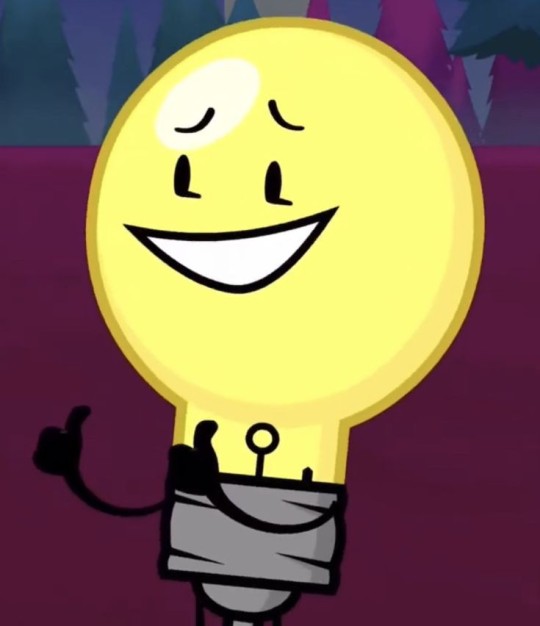
I'm making this post mostly as a reminder to myself To Not Hate Lightbulb because I actually think she's a pretty interesting character, but the way the fandom portrays her kinda ruined my interest for her.
The fandom's portrayal of Lightbulb ultimately just sticks to the nonsensical/silly aspect of her, which is pretty much what Lightbulb didn't want on canon to begin with. Interpretations and all that are understable, but I would like to just point out some things about Lightbulb. She's not just whimsy and sillyness and nonsense, her whole arc is about literally Toxic Positivity, Lack of Compromise, Lack of Leadership skills, Lack of Connection With Others and Unhealthy Copying Mechanisms.
Now Max, what the hell are you talking about? Well.
I personally think that Lightbulb is a genuinely good character. The way she copes with stuff really makes you see that she's really not doing great mentally. Of course, toxic positivity and sillyness may be her way to cope, because if no one sees her being vulnerable, they will never know what may hurt her the most.
I do think that she cared for Marsh in the same way Paintbrush did, but dare I say she also lacks emotional intelligence when it comes to comforting others or accepting those feels. Why talk about them seriously when you can just joke around and make them laugh about the issue? Of course that didn't happen.
Lightbulb has attachment issues, she doesn't want to be left alone, and she doesn't seem to be conscious over the fact that her attitude and way to approach others IS why she never truly got too many significant relationships at all until the very end, only for all of her friends to leave.
Having a "I don't care :]" attitude only did it so much worse for her on an emotional stand point because she ended up caring so SO badly for the remaining members of her group, and when her team was going down, she didn't know what to do or what to say at all. On late s2 she's actually getting the needs of her teammates and their struggles.
But I want to note something here. The reason as to why she "ditched" Test Tube so quickly on the alt dimension ep was because she thought that she found people that got her, people who were going through it but just wanted to keep thinking positively, and at the end of the day, that just doomed her. Because she realized that they weren't like that. She didn't find anyone that got how she felt.
You can only hide so much things with laughs and shenanigans and attitudes and addictions, before you realize that you have to own your mistakes and have to ACTUALLY TRY to be a better person.
Now, I don't think that Lightbulb meant things to go that way.
Thus all of these things are so much sadder when Fan and Test Tube get eliminated and Lightbulb is left alone. For the first time she ACTUALLY tried to let go off her unhealthy copying mechanisms and got close to people and lost them on the process. She lost all of her team because she didn't care seriously enough.
She's alone.
She doesn't like being alone at all.
So she's currently suffering the consequences of her actions.
And she doesn't like being alone.
Lightbulb struggles so SO much with having healthy relationships and healthy connections because she never was honest with herself at all. And when she realized that in order to be close to others, you have to grow and let yourself feel, it was far too late.
Her whole team is gone because of her lack of care for it and how she sucked at being a leader despite being an light to them, her unhealthy copying mechanisms indicate that she's been like that for a long time, and that the attitude she took was in order to cope with things feeling so so bad.
I really want to see what they'll do with her once s2 is back again. But for now, we can only hope so much.
#inanimate insanity#ii#inanimate insanity invitational#ii 2#ii 3#inanimate insanity lightbulb#inanimate insanity fan#inanimate insanity paintbrush#inanimate insanity test tube#ii lightbulb#ii fan#ii paintbrush#ii test tube#max overanalyzes characters
253 notes
·
View notes
Text
person who is sooooo normal about ray talks about the end of episode 10, what it confirms, what it introduces, and what it may even promise:
"can you please forgive me?"
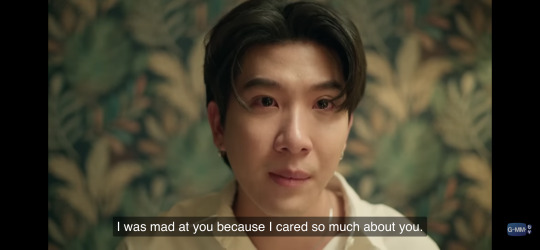
starting off with this line.... there is a specific brand of betrayal and hurt reserved for the people who feel like the only ones in the world that can make you feel loved. we've seen ray get angry and even lash out at the other characters before but we haven't seen him breakdown the way he did in the sandray apartment fight. i think i took ray saying that he finally was starting to understand his feelings more in episode 9 too lightly, because it seems he meant more then just "i think i like you too" kind of thing, i wouldn't be surprised if ray realized the love he felt as well, and not just romantic love but the "you've seen so much of the ugliness in me but still stayed" kind of love and, if im gonna be bold, acceptance.
"you can be angry or hate me all you want"
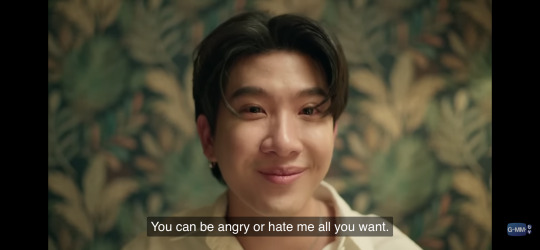
lines like this tell me two things, the first being the guilt ray feels over the way he treats people and the second being how much pain he thinks he deserves for it. though i will say this time it feels different then in episode 4 where ray asks sand to call him a burden, because before he wanted sand to hurt him back (a bit of retaliation a bit of self-harm even) but this time he is asking for sand's understanding and forgiveness. he still thinks he deserves it, but now its more then just asking for someone to hurt you in order to reconcile (we will get to the fact sand isn't really there don't worry) there is a sort of emotional growth is what im trying to say.
"i know now that you want nothing from me"
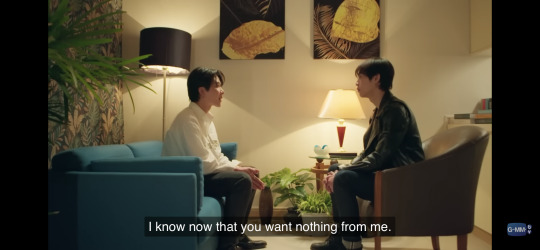
this is also such a huge line for me. we know ray views himself as worthless, he would rationalize why anyone would want him (this is why he was so hurt about sand accepting money from his dad but that's already been meta'd to death so i won't get into that), so him not only thinking but verbalizing that sand is someone who is kind to him without expecting anything in return is huge for ray's ability to see himself as more than a burden or his father's money. in fact, i'd say him admitting this here means he is already beginning to gain a sense of self-worth.
"though i've been nothing but an asshole to you, you are always there for me"

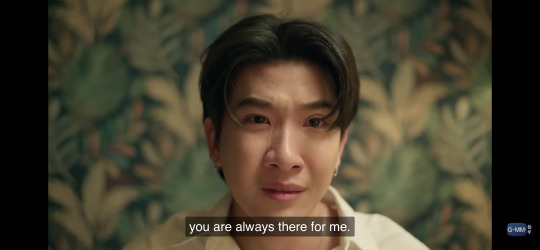
this is the part where we really see ray break. im not good at reading other people's emotions so im not gonna comment on what emotions the actor is trying to portray (tho he is portraying some big ones goddamn), from a text stand point, im interpereting this as pain. I talked before a bit about guilt but i'd say at this moment the realization that someone can care for him so deeply that the parts of himself he's sure are not only unlovable but hurtful won't drive them away, causes him a lot of pain. as someone who is bad feeling cared for or appreciated as a person and sometimes acts like a dick about it, i too would break apart at this moment.
"please understand me"

now this is the line that inspired this post in the first place. he struggles with the connections he has with others but you can see how lonely this man is. like he has been told he is a burden, he interperets his life events and the way other people treat him as proof he is fundamentally unlovable and bad luck for anyone he gets close to, and he is a self-fulfilling prophecy about it.
when he asks sand to understand him he's asking sand to look deeper then his self-sabotoging and attachment issues and see the love and care he has that he struggles to understand and feel and express. he is filled with so much pain how could it not start to infect everyone around him, but from what we see of him, he probably never wanted to hurt other people in this way to begin with.
i think the reason this line specifically broke my heart is that, so much of his behavior at times can be interpreted as a subconscious cry for help, help he won't except but help he needs anyway. i knew any arc involving ray addressing his addiction would destroy me because there is the pain experiencing the things i mentioned above, the pain in thinking you're helpless to them, and then the pain in doing what it takes to try to move forward from them, like this shit is hard. the clarity ray is able to adress imaginary sand with is so incredible even though its in his head, especially given how stubborn he'd been about admitting any issues in the first place.
"being with me requires some patience"
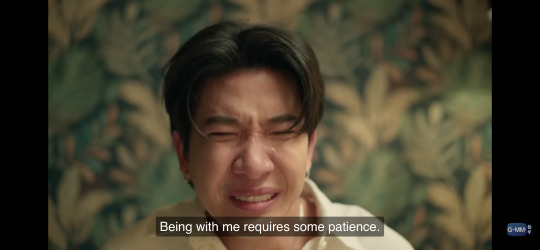
all that i said above and more... i don't think ray will get over that feeling of being a burden any time soon if he ever does because it becomes so ingrained in your worldview and the way you interpret other people's behavior. i like the way this line is phrased (i know its a translation but still) because it alludes to him feeling that he is capable of being loved, it'll be hard but not impossible.
"but if you don't want to put up with me anymore, that's alright. i get you"

remember how i just said i think he now believes he's lovable... well actually i still mean it. he's been constantly told and shown how his behaviour and mentality are hard to deal with, like he thinks his existence is so burdensome it killed his own mother BUT he now knows sand is different. he won't blame sand for not wanting to deal with him, he's always been aware of his shortcomings but can now honestly address the effect his actions have on others, and at the same time he knows that its possible to care for him.
this is why i think sand is his motivation for going to rehab, he's shown ray what is possible for him in ways no one else before sand has.
"but please know this"
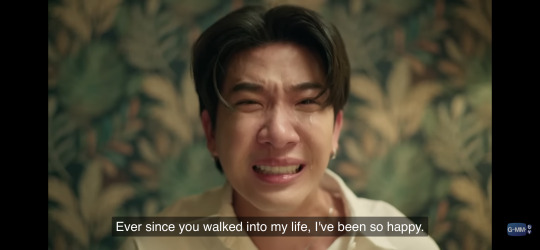
there is something so special about the impact sand has had on ray that i think goes beyond their relationship. sand made ray see the value in having a future, in being loved, in being happy. in episode 8 ray tells sand that he's finally happy when they spend time together, and it may seem like he's repeating it here but again this sand is imaginary. he's not saying this to get sand to answer his texts or hang out with him. he's imagining his reason for wanting to recover from addiction. like the weight this scene carries at least triples for me everytime i remember sand isn't really there. this was such a beautiful choice to make imo like ray saying these things to sand would probably be good for their relationship but it wouldn't have the same impact on ray's character arc.
my conclusion is once again don't know why i rambled on besides, ray as character was manufactured in a lab to drive me insane. like i've triggered my mood disorder twice over the course of watching this show but i wouldn't take it back for even a second. i love ray, i love what we've seen of his mentality and backstory, i love that we're seeing him making the decision to address his addiction, i go numb with the thought of where his arc will go next, but i especially love seeing everyone come together to scream about this character that means so much to me (not at all subtle reference to the fact i've read hurt and grieve but don't suffer alone by @jgyapologism what three? times now) anyway hope we all continue to scream about him this week. 🫡🫡
#only friends the series#only friends meta#sandray#oh ray#ray only friends#ray pakorn#only friend analysis#ofts
205 notes
·
View notes
Note
*enables you* what happened with TLJ 👃
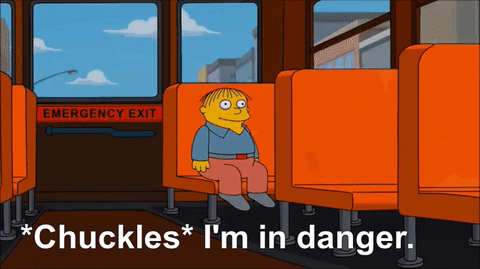
After all these years I still can't properly find words to explain how deeply betrayed I felt after the credits rolled and I shuffled out of the movie theater with everybody else. There was a TON of hype surrounding this movie, an absolute fuckton. I only saw positive reviews about it, the cast, the director, the plot. I got excited to see where Rian Johnson & Co. would take the ST.
The only remotely negative comment I saw before watching the movie was a fandom blog saying they didn't like what happened to Poe. Since this blog was about racism in fandom, I knew something was off. That was my only warning.
And y'know, it was like, five minutes in? Ten minutes? And Poe makes a "Yo mama" joke at Hux? I used to go into movies with an open mind and spent days gathering my thoughts about them because I was always slow to react, slow to gather my thoughts into coherent strings of words. It's how I enjoyed Michael Bay productions and JJ Abrams' love affair with lens flare. I never got actively angry with a movie I was watching, and I was fucking angry by the time the movie ended. I still remember texting a friend while standing out in front of the theater because I was so confused. The response to TLJ was so positive so why did I come out of the movie so frustrated and confused and dissatisfied with the whole thing?
It's been years and we all know how this movie divided the Star Wars fandom and just... broke Fandom Spaces in a way I never expected. We all know what TLJ did and didn't do, and how TROS provided the final nail in the coffin that was the ST experiment. But back then, all I saw was positive commentary about the themes and messages of TLJ, how it portrayed failure and the dangers of putting someone like Luke Skywalker on a pedestal, how the Force was female, how... important it was to see Poe get characterized as a hotheaded hotshot who needed to be demoted, slapped around, and stunned in order to learn some kind of lesson, how important it was to see Finn lose everything he gained in TFA so that he could relearn how not to be selfish or something while starring in a fucking incredibly tone-deaf B plot, how Rey... I'm not sure exactly what because she didn't need training anyway and then spent most of her time trying to bring Ben Swolo back to the light????? Rose was so promising as someone who grew up under the FO's thumb but she and Kelly were fucking abandoned by Disney so I don't know if Rose existing was actually a good idea if it meant giving Kelly unending trauma. Mark slipped up by calling Luke "Jake" and expressing his displeasure in front of cameras, and I was so fucking baffled and alienated by his character after knowing how his story ended in ROTJ that I couldn't connect with whatever lessons I and he are supposed to be learning. JJ set up Snoke like a mystery box and Rian just yeeted him off without so much as a fucking explanation so what was the point of that? Hux was a fucking joke. Phasma was barely there. The only character that Rian cared about was fucking Kylo Ren and Adam says years later that he was never supposed to get a redemption arc anyway.
Like, this was the movie everyone hyped up? This was the movie that didn't answer any questions left unasked by TFA and didn't bother to move forward with character development for any of the known characters? I spent money watching a slow space chase that ended on a planet made of salt and killed off Luke for Reasons? Am I stupid? Am I dumb? Am I a peasant incapable of understanding the masterpiece Rian directed, this so-called Best Star Wars Movie Since ESB?
But I couldn't say anything. I couldn't be dogpiled for hating such a empowering movie for women, a diverse and inclusive movie that had the likes of John and Kelly and Oscar. I couldn't be lumped in with the Star Wars dudebros with their raging misogynistic and racist takes on the movie, the cast, Kathleen Kennedy and Lucasfilm, Disney, etc. I couldn't be seen as one of them just because I didn't like a movie that I should like, I'm supposed to like. So I sat in silence, read meta, witnessed the fucking catastrophic explosion around some wild ass AO3 fandom essays written by a racist OG member of OTW about Finn/Poe, saw hate piled on black and bipoc fans, saw r*ylo fans come for John and John clap back at them, just saw an absolute fuckton of hate, and so by the time TROS came around I just... checked out. There was no way JJ could salvage what Rian had done and I was right. TROS was a corporate-run soulless garbage end to the Sequel Trilogy, but it ended just as The Mandalorian finished its first season and regained a lot of good will with this small story about a lonely Mandalorian bounty hunter who encountered a Force-sensitive Baby Yoda.
And then TBOBF/Season 3 of the Mando Show happened, just like how TLJ happened. All the promise, all the unanswered questions of the previous movie/season, all fucking dropped or provided with the worst, most unsatisfying answer. I'm sure others have found better answers and can live with what Star Wars gave us, but I haven't been able to. TLJ came out years and years ago, and I am still so bitter today. I'm still so bitter because TFA had such an incredibly compelling setup with such promising characters, and then TLJ Did That.
I got so heated while writing this. I'm still so mad. I'm still so bitter. I bury my head so deep in the sandbox I built for myself so that I don't have to think how Disney is twisting and contorting all these Mando'verse shows so that they all eventually lead to the ST, their precious hot potato child that just... didn't have to end the way they did if they actually had a fucking plan and fucking stuck the landing. I'll give the MCU this - their Phase 1? They fucking stuck the landing. I fell off the train tracks and haven't really watched the MCU since Captain Marvel, but at least they had a fucking plan and didn't fucking derail themselves like Disney did with the Sequel Trilogy.
I could be nice to people who like this movie but I'm not going to be. They can be nice on their own blogs.
Man, I can't even watch Knives Out or Glass Onion because my blood starts boiling. Just. TLJ did a lot to ruin what I hoped would be a positive and creative connection with Star Wars, and it took the Mando Show and the 2 minutes where Din and Luke locked eyes on the Imperial light cruiser to bring me back.
I'm gonna stop before I get way too heated for sleep.
#shirozora awkwardly responds to asks#anti TLJ#this is 100% a TLJ hate post and blog#i spent so many years holding in my thoughts about this cursed movie#when I say spite fuels me this is what I mean#this is how I find comfort in 'love star wars. wish it was good'#anyway this was the movie that made me feel crazy for years because how could i hate this movie if everyone said it's good#how can a movie be good if all i got from it was confusion and betrayal#time to go art something and calm down before bed
86 notes
·
View notes
Text
bungo stray dogs, themes of trauma, the abuse cycle, and how ranpo's disability+autistic trauma is an integral part of untold origins ★
🦴 abilities represent trauma and trauma responses
🦴 trauma as a theme of cycles
- the abuse cycle
- the "savior" cycle
🦴 the government, war, and society
- yosano, mori
- verlaine, chuuya
- fukuchi, teruko
- the role of the government
🦴 untold origins
- ranpo's ability is autistic masking
- his trauma
- untold origins through the lens of autistic trauma
wc; 2.6k (Origins quotes included in pictures only but I explain them briefly)
(this is also crossposted on Twitter, this is a long read format)
In this I want to cover trauma, and by extent mental illness, as an overarching theme in BSD, and how it portrays the cycles and effect of abuse, war, and is an exploration of traumatized individuals operating in a world not built for them. Additionally, Untold Origins is about autistic trauma.
Despite the approach of supernatural themes, Bungo Stray Dogs lends itself heavily to the discussion of trauma, mental illness, and its effects. One of the most notable themes in Bungo Stray Dogs is trauma and abuse, but it extends beyond the main abuse chain that most recognize to partially originate from Mori and end with Kyouka (Mori, Dazai, Akutagawa, and Kyouka, to be specific). There is a large focus on the abuse cycle and how trauma affects people. Emphasis is also placed on the specific structural abuse and violence of society within the world of BSD. The complexities of the abuse cycle are highlighted in organizations such as the Port Mafia, which is by far the most recognizable example within the series, but the government as another authoritative state plays another role in the cycle. BSD shows its readers various depictions of how trauma will manifest or affect two people who encounter the same thing. BSD shows a very honest depiction of mental illness in general, but it's specifically in how trauma affects the characters that these themes become integral to the story.
To start off the actual analysis, abilities themselves are representative of trauma responses. They arise from high stress situations in order for the user to have a protective mechanism for themself, uncanny to how actual trauma responses develop. Whether you think it is non-exclusive because abilities are based upon literature, many if not all of the characters’ abilities parallel their trauma. This is highlighted with tons of the characters, obviously, but I'll only point out a few because a separate analysis would be needed for every ability in the series (I want to one day, but not now). Each ability exhibits what each ability user needed in order to survive. Atsushi was a victim of child torture from what could have been birth, or at least since coming into the orphanage, to young adulthood, and he needed to become something to combat it. Beast Beneath the Moonlight is an ability that allows Atsushi to become something near invulnerable, with his impenetrable fur, regeneration, and the claws that cut through abilities themself. No Longer Human reflects how Dazai never allows anyone to get close to him, how he always keeps his guard up, how he never allows himself the vulnerability of being seen or touched. Both literally and metaphorically. Akuatagwa, similar to Atsushi, growing up in the slums needed a way to protect himself, Gin, and the other children around him. His ability is one that I feel is the most obvious with its connection to his trauma, as it is so important in depicting his relationship with Dazai and his own ability, though that is more about his coat itself than explicitly Rashomon. He only had the clothes on his back to protect him, so that is what manifested, the ability to control and kill his enemies with what little shield he had against the world. These will be the only ones I highlight in this section as they're some “main” examples and this is not meant to be exclusively on what the ability represents for individual characters. There are also plenty of characters that we can only speculate on, as we don't know much about their past, if at all many of them.
The cycle of abuse is the main theme present under the topic of trauma and how it relates to BSD's story. The most notable abuse chain that runs from Mori, to Dazai, to Akuatagwa, and finally ending with Kyouka is easily the most recognizable example of this. Whether you believe Mori's relationship with Dazai, and affect on him, was inherently classified as child abuse is irrelevant here and up to interpretation, I suppose, as a lot of people seem to believe so for some reason. Regardless, you cannot deny that the lessons of optimal solutions, needing to live for a purpose, and harsh treatment runs in this line of mentor/mentee relationships.
This is also the case between Mori and Yosano, though I'm not sure how much Mori would constitute as a “mentor” to Yosano over just being her superior, considering his relationship and treatment of Yosano is vastly different compared to Dazai. The cycles of abuse is not only present within the mentor/mentee cycle of BSD either, another major example is how many characters treat others based upon how they would treat themself, and this treatment arises from a place of projection. In the Dark Era, Mori acts according to his own judgment, assuming that Dazai will not act adversely based upon the shared qualities he sees of himself in Dazai. A shared logistical, observant brain and their ability to navigate a situation through predicting and utilizing their pawns. Dazai trains Akutagawa the way he does because he believes it is what Akuatagwa needs in order to be successful and survive.
Kouyou is a very great instance of this, too. The Port Mafia is a root of much of the abuse taking place within the story of Bungo Stray Dogs, and Kouyou shows this the best, aside from characters like Dazai and Akutagawa. This is where I want to specify that Mori is not the root cause or direct start of the abuse cycle within the series, as the Port Mafia itself was a tool of organizational abuse from the start. The Port Mafia has always used tactics of aggression and suppression as an operation, however, there is a stark difference between the Old Boss and Mori on how this force is used. There is no real difference on how they affect the Port Mafia individually, except the methods used and the tighter reign of control Mori uses compared to the reckless abandonment for critical thought towards the end for the Old Boss. It's an inherently corrupt organization despite the importance it holds in the balance of Yokohama. Kouyou was in the Mafia from childhood, and when she lost the hope of being able to escape that world, she lost her trust in both the organization and the greater world of people. This is the reason that she pushes her own beliefs onto Kyouka and tries so desperately to keep her in the mafia. Her disdain for hope and recognition of herself in Kyouka is the causation for her to attempt to drill this mindset into Kyouka.
Kouyou isn't the only one who projects herself onto Kyouka specifically either, as Akutagawa follows the lessons he has learned and forces his beliefs of giving Kyouka's life a “reason” through her ability and killing ability. Which is exactly what he learned through his years in the Port Mafia as Dazai's mentee. Another example of a character projecting their own traumas onto someone they recognize themself in is very obviously Verlaine, through the events of him forcing Chuuya to his side because of his thought process.
There is a common justification that many of the characters make that they are doing what needs to be done. There are many other examples that could be made from the series, but all of this is to say that there is a large representation of the idea that “hurt people hurt people”. It's what the abuse cycle is on an interpersonal level. The actions taken are not excused by a victim’s own past, however it is a very real depiction of the abuse cycle and its effects in the series.
There is some hope to be found though as the parallel to this is being “saved”. Exemplified through the Armed Detective Agency as a whole, it ends up being essentially a safe haven for many of the members. Earlier I mentioned Kyouka, and she is specifically helped by Atsushi. I really don't want to refer to this as a savior cycle because it's really not, they're not all “saviors”, I just don't really have a better name for it.
The best examples for the roots of this cycle in the series are Fukuzawa and Oda, though they are naturally not the only cause for the chain of events within this cycle of influence. Fukuzawa brings me back to the topic of the Armed Detective Agency, which was established in the first place in order to help Ranpo and others. He left his influence on Ranpo first in Untold Origins, and Yosano when the two are able to get her away from Mori, but he also is the first in the chain that impacted Oda (though not the only), another important figure in this theme. He is the person that is able to plant a moral seed in Dazai and change the course of his life, and he was the only one able to do this. This brings me back around to Atsushi, who after being taken into the ADA by Dazai is able to save Kyouka, Lucy, and Sigma in one way or another.
It is important to highlight the Decay of Angels arc and portraying the tragic results of war. The ones I'm going to discuss are Fukuchi, Fukuzawa, Yosano, Mori, and Teruko as participants of war, Verlaine and Chuuya as the result of the government experimentation after the war, and then Tachihara from an outsider's perspective because of his brother. There is limited information that we have on The Great War itself, but what we do know is that it was a fight between ability user organizations and for the use of abilities in warfare. It is shown to be the cause of much of the suffering of many characters in the series, whether it is as a participant or a result of the inherent tragedy of war. Yosano was a child soldier exploited by Mori, who was able to use his position to prove his thesis for the beneficial use of abilities in warfare. It's unclear to me whether it was issued from upper levels, but his Infantry Division was for the purpose of proving what you could harness with abilities and warfare. This is not the only time that ability experimentation resulted during/from The Great War either, both Verlaine and Chuuya were a result of ability research and singularity creation. You could also infer that The Hunting Dogs project, though it is not confirmed (I think?), is a result of this as well. All of this to show the role that the government plays in the war, and alongside the damage that war already brings the government is shown to prey on the vulnerable within.
Fukuchi is probably the most noteworthy example of war and trauma in BSD, as he is the one who enacts the greatest damage in order to stop another war to his knowledge. His entire motivation for creating the DOA and bringing calamity was to prevent a repeat of what he had witnessed in the battlefield. Though he also has personal beliefs for world peace from the beginning, it grew to be more than that. The war intrinsically changed him due to the trauma, and soldier’s PTSD is naturally a common thing. The war changed Yosano as well, and while the two had very different circumstances, they carry the weight of their sins years later. Teruko was essentially born from war itself, and similar to Atsushi, she was forced to become something or someone that was able to fight, hence her ability forcing maturity and age. Teruko's ability itself is an example of how intense or prolonged trauma can cause a person to force self preservation in the face of it as a tactic to survive. Many of the characters show this, but it is especially prevalent with Fukuchi and Teruko because of the war. The entire arc brings into question the role of the government in war, corrupt power, the tragedy of war, and the point of it in the first place.
I'm making a seperate section to talk about Ranpo's ability, Untold Origins, and autistic trauma. Ranpo is the only character based on an author who does not have a literal ability, and I believe his lack of ability and insistence on keeping the illusion up is reminiscent of autistic masking. As to why I think he is autistic outside of the context of Origins, please refer to this thread .
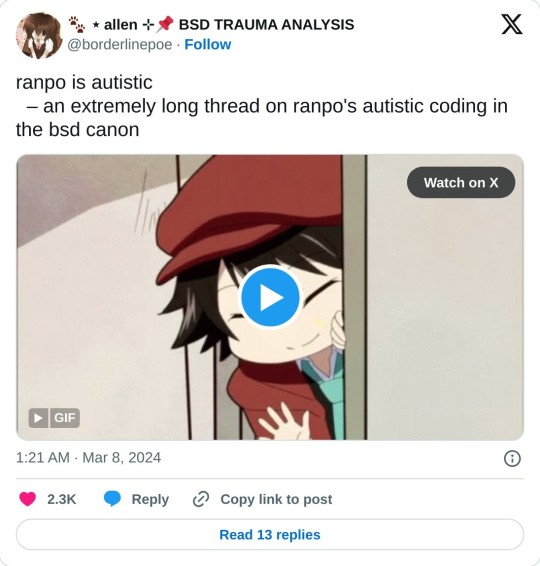
Masking is camouflaging autistic traits in order to appeal to neurotypical or allistic (non-autistic) expectations. This could be internalizing discomfort, suppressing behaviors, copying others’ behavior in order to “fit in”, or an array of examples of forcing yourself out of your nature. Long-term masking can lead to extreme damage to your mental health, it can cause burnout, distressed behavior (meltdowns, shutdowns), issues with sense of self, etc.
Ranpo doesn’t mask very much in the present canon, he has a support system with his friends and family in the ADA where he is not judged for his autistic traits or behavior. Yet he keeps up the illusion of being an ability user partially for his own sake, but mostly to appear a certain way for the Agency and others. His ability is the only mask he keeps up, and the reason for this is the same reason he got it in the first place. Ranpo had to deal with the world outside of himself not accepting him for the way he is, and this is specifically because of his autistic traits. His false ability was essentially given to him by Fukuzawa as a way to quell his frustrations with the world, an explanation to Ranpo for why he is the way he is, because the world didn't understand the way he was and vice versa. He does seem to mask his autistic traits in Untold Origins, however, both due to his experiences he talks about and his parents. Masking can be traumatic, growing up in a world not built for you is traumatic, and the culmination of it all is what leads to Ranpo’s meltdown. Being autistic is not inherently traumatic, but the instability of day to day life can even be a causation for it, and this is the case for Ranpo. He goes about the story assuming that he will get adverse reactions if he speaks up or acts like himself, showing specifically his autistic traits, and this is the reason that he masks. Like any other autistic person, he masks in order to survive situations or to avoid confrontation over it when he never intended it. He was already a sheltered kid, and so he was raised with the deliberate suppression of his autistic traits, to which he cannot control and that cannot be separated from him. Even if it was an effort to protect him by his parents, it had negative consequences on Ranpo. Growing up that sheltered is damaging enough but it is dire to understand that this is in relation to Ranpo's being autistic as well, so he was thrust into a world that already did not understand him as a young autistic person after he lost his parents, an added trauma on top of the loss.
(below are the quotes I was referring/alluding to)
(In order is Ranpo's meltdown scene, an example of the double empathy problem (difficulties due in part due to a mutual lack of understanding when socializing between autistics/allistics because of the way we experience the world internally/externally) in which Ranpo looks at the same thing as someone else but they percieve it vastly different and Ranpo does not realize this, an observation from Fukuzawa on Ranpo's inherent difference, Ranpo's expectations of rejection, another observation from Fukuzawa on how Ranpo doesn't realize any of this, Ranpo expecting rejection based upon experiences in the past, and finally what I interpret to be an example of suppression of Ranpo's autistic traits (in a literal sense it is referring to his ability, which is representative of his autistic masking/really autism in general)
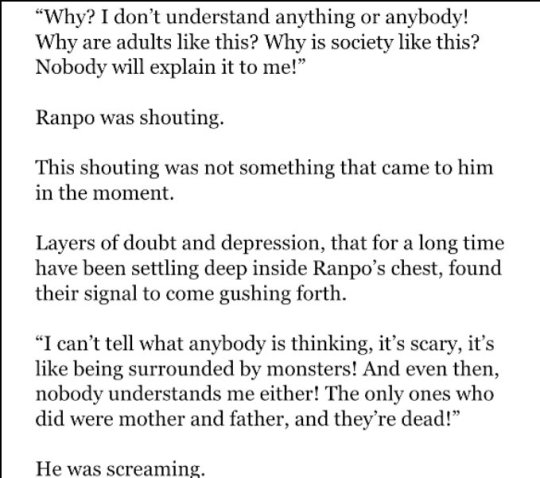
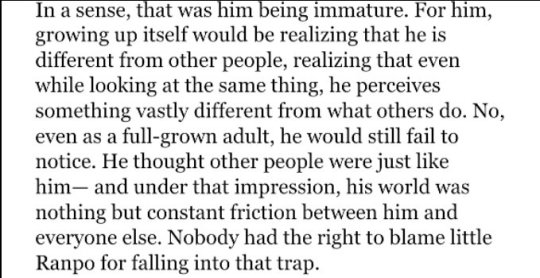
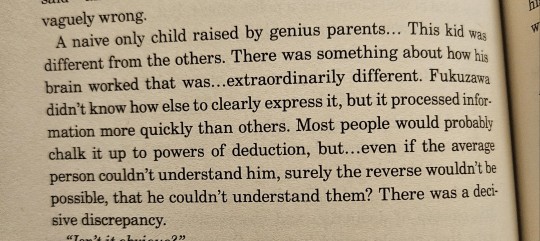
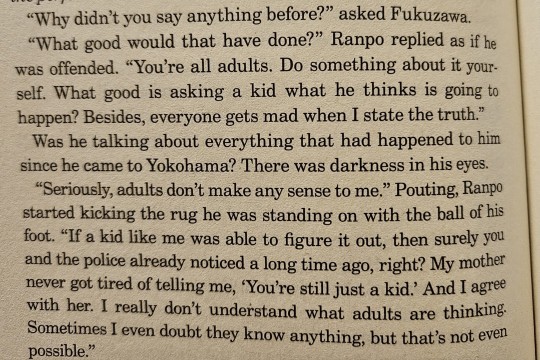
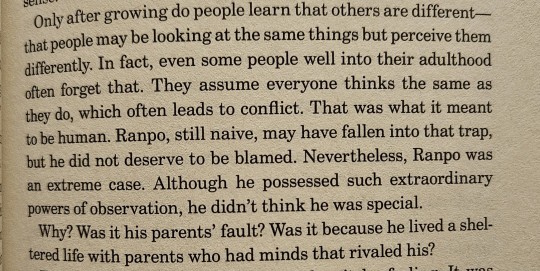
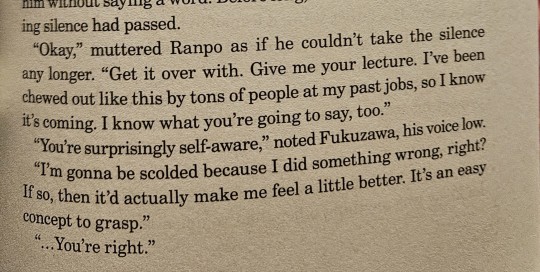

The manifestation of his ability is not a literal one like the other characters in the series, but it is an extension of his need to mask at times. Whether it is damaging or not, Ranpo clings to it because it is both connected to Fukuzawa and it is the first time he got an answer to why he is this way instead of being told to hide it for the convenience of others. When you grow up in a world that does not like you for what you are, it would only be natural for him to be desperate for the comfort of something after believing for so long that there was something inherently wrong with him.
There are definitely more thoughts that I have on this topic, such as poverty in relation to the Akutagawa siblings and Atsushi (Beast, specifically as well), but I want that to be a separate analysis.
#bsd#bungo stray dogs#bsd analysis#allen bsd thoughts#allen.textz#atsushi bsd#kyouka bsd#dazai bsd#akutagawa bsd#kouyou bsd#mori bsd#verlaine bsd#ranpo bsd#yosano bsd#fukuzawa bsd#its not only them covered they are just mentioned the most#ranpo is autistic and its blatantly obvious#autistic media analysis
31 notes
·
View notes
Text
Tbh not a fan of how some people are so obsessed with framing Belos as some sympathetic, tragic character on account of his parallels with Luz, that they basically rob him of any and all agency to reduce Philip to some mindless follower of his puritan community, even in their explicit absence while having the support of Caleb, whose opinion he should prioritize if it was truly about what others have told him. This woobified take of some superstitious dingus/helpless child who can’t make any decisions for himself feels infantilizing and at odds with how Belos is actually portrayed in the show.
Plus, the whole argument of “That’s how it was back then” in order to justify or at least explain Philip’s bigotry feels rather hollow, because like. Not only does Caleb (who was also a child not much older) exist, but this rationale was used to justify a lot of historical people’s pro-slavery attitudes, because “it was just normal” back then, so surely we can’t judge these people by modern standards, right? Especially not to replace a Confederate statue, right?
(For the record, I highly doubt people who use this logic in regards to Belos are intentional about this comparison, I don’t think they made this connection and still went with it anyway.)
Except people back in the day DID call this behavior out, there were always people opposing it, hence the existence of a character like Caleb. And this is a point that’s being raised a lot in regards to this subject about judging people of the past with contemporary values. Abolitionists existed just plenty in the past, and it’s their work that led to this social change over time.
Plus, the framing of Philip as some superstitious Puritan who genuinely believed in his church’s teachings about sin, and is legitimately concerned for people’s souls, indirectly presents him as only needing a good argument and evidence to change his mind. Except we see how Philip is a highly intelligent, calculating individual who can figure people out like it’s nothing, extremely observant and approaching his analysis of the Demon Realm with a professionalism bordering on the scientific method.
That scene in For the Future, where he’s confronted by alleged ghosts? I think it’s meant to support what the Titan clarifies in the next episode; That Belos KNOWS he’s wrong, that he’s just lying about it. The problem isn’t that he needs to realize this, it’s that he already has, but won’t admit this to himself to change his behavior in response. I doubt Philip truly believes there’s a God expecting something of everyone. And remember Grom, when Luz says “You’re not coming from a place of intellectual honesty, so debating you would be pointless!”
Jacob Hopkins strays close to the Dudebro image that Luz directs this line at; And we see how he’s not actually driven by reasoning, but by a delusional need to be the hero. And Jacob’s comparisons to Belos need not be stated; A lot of fascists AREN’T approaching from a place of actual logic that can thus be reasoned with, hence why punching them is a necessity.
It’s not as if they’re just working with faulty evidence that they’ve drawn a misguided conclusion from; They come in with a predisposed ‘conclusion’ they’ve already decided on, and then look only for the evidence to support it. Which is ironic, given what I said about Philip appearing to be someone who would use the scientific method in his studies, but bias is bias. It’s like how other races being inferior was made up to justify slavery as an economic boon; Rather than people naturally assuming other races to be inferior, and THEN making slavery as a result of that conclusion.
The bigotry is all an intentional excuse made to justify an ulterior, power-hungry motive; Why else does Thanks to Them frame other witch hunters as just making things up about their neighbors to seize their property? And remember when I compared King James I of historical infamy to Philip, speculating that his real-life book on witchcraft may have influenced Philip’s diary from a writing perspective, if not an in-universe one as well? A lot of people speculate James didn’t necessarily believe in witches as a threat to humanity; He just latched onto them as a scapegoat to legitimize his power. Because if the agents of Hell see you as a threat, doesn’t that suggest you as divinely ordained?
And I think that ties into Philip’s shallow understanding of the Demon Realm; These people are inherently evil, so if they do anything to hate or oppose him, it’s because Philip is actually an agent of Good, a divine hero, and all of these demons are some magical hivemind that uniformly collaborate to prioritize opposing Good. He’s every bully who needles and harasses a minority, and acts vindicated when they DO lash out, as the creator of a self-fulfilling prophecy.
And while there’s a lot to be said about not feeding the beast, sometimes you just HAVE to defend yourself, and not care about proving your worth to someone who isn’t approaching from a place of good faith, whose approval is meaningless, especially if it comes at the risk or even cost of your own safety. Hence all this real life discussion of queers and other minorities not having to be palatable to deserve rights.
In the end, I see Philip Wittebane as akin to Walter White, of Breaking Bad fame; I’m sure he DID legitimately care about his family, to an extent. But if it really was just about them, and not the cheap thrill of some power fantasy, he’d have accepted the help given to him, instead of going on this ridiculous quest to accumulate strength so he can become the Biggest, Baddest person who can crush his enemies.
And in his constant pursuit of that high, what concern for his family and others he might’ve had withers away into nothing; Until the Titan’s summation of Philip as someone who only believes in his delusional need to be the hero doesn’t just make sense from her in-universe perspective, but as a description with implied authorial backing. Family? That was just an excuse, but at least Walter White had the guts to admit this aloud to someone else.
215 notes
·
View notes
Text
The Pathologic Russian and English analysis: Artemy Burakh the Haruspex.
On this episode of “I am definitely not okay and dedicate my time to sillygoofy things” - we look at the Haruspex in the Bachelor's campaign. This alone took me a whole month, because there is a lot of funk happening in my life, so the Changeling will have to wait a little more. Anyway. Y’all maybe don’t know the drill quite yet, so let’s start at the beginning.
What is the Haruspex like in the English version? Well, discarding the “sweet but tired dad” persona that the entire fandom has assigned the poor guy, the impression I got while watching people playing through the game is that he is first and foremost a very impulsive person, and that, in a way, carries over to his speech. He’s also very cryptic to the other healers, in that ominous “you shouldn’t have done that” way. If I hadn’t read at least a bit of his dialogue lines for the previous analysis, I would have assumed that he’d be the one to use all those “rough” words every other sentence, since that’s how people from outside of the capital cities are usually portrayed. In the Bachelor’s campaign, he is almost like a goddamn cryptid, that tells you he doesn’t know what antibodies are and then presents you with a panacea on the very next day - he speaks very little and does not bother with niceties besides the honorary title. In the Changeling campaign, all those factors seem to be even more emphasised. Overall he acts even more distant, even more ominous and is even more threatening, since it’s seen through the eyes of a scared little girl (she’s also a miracle worker but we won’t talk about it now). Both of the campaigns are, of course, drastically different from what we have in the Haruspex campaign - which is where we get to see the whole “guided by the heart” thing in action. From the other two’s perspective, he is an ominous, potentially volatile, but still helpful figure. And his speech matches that exactly. So let’s get cracking.
As the Bachelor: the vibes are pretty consistent between the English and Russian version. The Haruspex is just as cryptic and curt in both of them, and doesn’t talk in the manner usually given to all these “rough and dangerous” types in Russian fiction. In all honesty, I think it’s the fact that his manner of speech is so simple and short that made translating it to English so much easier (or at least I think it was). Sadly, there is so little dialogue, that it also meant I barely get to talk about anything interesting, since what little there is to look at, is mostly accurate. But, when there ARE differences… Oh boy are those differences. So, you’ll see a little bit of other characters in this analysis as well because these interactions in the Bachelor campaign felt almost like an afterthought. Like, the writers knew how the wanted them to meet and part, so in the middle, they just used Burakh to be a tool for exposition, and not much else. Additionally, the “fairytale-like” way of speech that Artemy has in his own campaign seems to be gone here, and I can’t wait to see what happens to it with the Changeling. With all that being said, here is the more fun stuff: aka the snippets and screenshots! Once again, the chronological order is dubious at best, and most of this was written at two am in the morning, so I hope this isn’t completely insane.

Very interesting choices made in the translation here. First and foremost - instead of relying on his heart to guide him, the Haruspex specifically says that he is guided by “his love” which, depending on how consistent this change is, might strengthen the connection between several different themes. Now to the fun part - “it’s a shame we aren’t standing together.” I need you people to understand that I am trying to remain as impartial as possible when I write these, without inserting my own opinions of the story or anything. But, the much more word-for-word translation of that line would be “Pity, that we aren’t together.” And yes, people being “together” does also have the same connotation in Russian as it does in English. And while I understand that it’s mostly likely supposed to imply “allyship,” I think it could be worded a lot better, had the writers wanted to avoid misunderstandings.

Let’s focus on the last sentence here: in English, the Haruspex says he admires Rubin’s determination to help people. In the original version however, the sentence is “He deserves respect.” See, the interesting thing here is the difference between “I” and “everyone.” Where in the English version Burakh voices his personal approval of Rubin, in Russian it’s an unspecified, but general statement, which bears the implications that others should respect him as well. And while the difference itself isn’t too significant on its own, when paired with the fact that Rubin is someone who’s on the run from half of the town, it hits a bit different.
Also, and I didn’t really know where to stick this, and maybe this could’ve waited until we actually got to Rubin as a character, but yeah. I wanted to point out specifically that the word “master” in Russian doesn’t have a dual meaning. Cuz, correct me if I’m wrong, in English this can both refer to a master of a certain activity (ie martial arts master) as well as a proprietor of something (ie master of the house). In Russian, however, the word “master” refers exclusively to a “master of their craft” type of people. A master of a property is referred to as an “owner”. The “Mistresses” in Pathologic are also referred to as “owners” (with a suffix that indicates female). This creates a bit of a confusion, because the word exists in both of the languages, but only shares some of the meanings. And uh… This is related to this quote because uh… Something-something recognition of expertise.

I’m personally a big fan of the themes of freedom, and how different people react to losing their freedom of choice, or dealing with the information that they were never free to choose to begin with. And that brings us to this little line, which I find particularly interesting. In the original Russian dialogue, Burakh says that he had already “lost” his freedom, in the way one loses something in a game. I feel this shines a different light on both how he eventually reacts to being told that he’s just a toy in a child’s game (he’s had to deal with disempowerment this whole time, it’s nothing new to him) but also with how he views his loss of freedom. Not something that some higher power has revoked from him, but rather something that he himselfs basically “gambled away.” In that sense, I can see the eventual reveal that everyone is simply a toy in a sandbox being a relief. In the way that it wasn’t his fault after all, that everything was predetermined, and that he couldn’t have carelessly lost something he didn’t have in the first place. Makes me wonder what the dialogue between these two would’ve been like if they’d met on the first day in this campaign.

I have a shamefully small amount of notes as I go through these, so I’m literally latching on to anything to talk about. I pointed out how dry and laconic the Haruspex is, but god DAMN if that doesn’t make for text that’s easy to translate - and that gives me less things to work with. For example this - a simple word difference in the last sentence that you couldn’t possibly translate properly without sounding illiterate. Because as it is - the translation is accurate in the last sentence. But that’s because “evil” in English is both a noun and an adjective. In Russian, however, the adjective for “evil” also makes for a synonym to “angry” and that doesn’t fit with the meaning conveyed here. Burakh calls Clara “evil itself” the embodiment of evil, all that shabang. It’s something that is recurrent in people talking about her, from what I’ve seen - people address her as a concept, and link her to more generalised ideas, rather than specific characteristics. Either way, it’s a fun thing to think about.

Hi, confused, I’m dad. I did a thing where I tried to read the English dialogue in its entirety first, because I wanted to avoid talking about information that was already accessible in English, and I remember being confused at this line, because… The cattle grounds were on the other side of the Gorkhon? Since when???? It didn’t make sense with the rest of the dialogue either, and the Russian version says “on this side of the Gorkhon” so… What gives? Assuming that the website is accurate (cuz if not, then I’d have to go and check in the actual game which would take hours to get to) does this then just mean it was a simple translation error? Or did the writers decide to change the lore as they were translating? It confuses me so much, because overall the game is well translated, so I don’t get how no one noticed that the meaning of the sentence becomes completely flipped here. Anyways, if you’re like me and that confused the hell out of you in English, just know that it makes sense in Russian and you can sleep soundly. Also, on the more chill note, there is no reference to a kraken in the Russian version, the deposits are compared to octopus tendrils.

I know this isn’t Bachelor time again, but I wanted to point out that there’s a switch back to the formal “you” here, and I feel like it throws a wrench into my previous theory. Or maybe it supports it. Let’s try to be objective here. The simplest explanation could be simply that this is a continuity break, that this was completely unintentional from the writers, and that I am trying to figure out why the curtains are blue in a situation where they are, indeed, just blue. But we like fun here, so let’s assume the curtains are blue for a reason. The real problem is whether this works with my previously established theory, or if it's for a completely different reason.
If we are going with the supposition that the Bachelor switches to formal “you” when he is uncomfortable (which some people found strange when I brought it up, but it’s a legit thing in Russian. Like, I do that sometimes when I want to place a little bit of professional distance between myself and whoever I’m speaking to, though sometimes the person might get upset if you do that) then one possible explanation would be that he is uncomfortable with the implications that this new knowledge has brought to light - a huge residential part of the town is sorta kinda maybe doomed. It could also be the overall dread of what the other piece of news would be.
On the opposing side of this argument is a somewhat mundane explanation that would bypass my theory completely. The idea that the switch to a more formal language was either an attempt to keep the conversation civil and “professional” at a spot where a conflict of interests could potentially emerge, or the possibility that it simply happened because sometimes a person doesn’t know where they stand, or what would be more appropriate in this situation, and opt for the safe formal version.
I do want to apologise, in case y’all don’t wanna hear these hypotheses of mine, I just thought it would be unfair to pretend like my explanations are the only ones out there, so yeah.

Welcome back to “mom pick me up, the translations are being weird again” this time - "my confidants are alive. Are you sure they’re alive? I see no problems." Perfect, flawless logic, I love. And while I understand that the original Russian version uses a very “ye olde” version of “if,” I still assume that the translating team spoke Russian and understood the meaning of the sentence. For context - the modern version of “if” in Russian is “если” (yesli). However, in this line, the Haruspex uses an older word “коль” (kol’), which implies a condition, or an “if” scenario. But the word itself isn’t extinct, people still understand what it implies, the same way native English speakers would know that “thou” means “you.” Like, I can’t imagine how the meaning got flipped in here, it just confuses me. Either way, the “I see no problems with that” is also kinda wonky, because it makes it sound like Burakh has no problem with the “my bound are alive - so I’ll be at the meeting” logic. In Russian, he specifically says “-I’ll come. I see no obstacles.” As in - there is nothing to stop me from doing so. Anyway, translation wonky, let’s see how the rest of it goes.

Now that’s an interesting difference. And a morbid one at that. This is the line where the Haruspex talks about his bound “rebuilding the settlement and turning their lives to become the angels of its foundation.” Which I interpreted more in the sense of - becoming the highly revered figures of the town, with lots of authority and responsibility - like angels. And I’m curious to see how y’all interpreted this, because I did not anticipate the Russian version in the slightest. And it’s this: “... my bound, that are destined to bring this town back to life and lay down their lives under its new cornerstones.” For one, I find it curious that both in English and Russian there is such a similar turn of phrase - because “lay down their lives” could have been translated almost word for word. But also… I am so confused. Is the sacrifice in this sense a literal one? Or does he simply mean a dedication to the town so strong that it could count as giving up one’s life? Either way, this is definitely a curious difference in translation, and I’m not sure what to make of it.

The interesting thing is… For the most part the “Are you aware that we turned out to be toys” dialogue starts the same in both the Haruspex and the Bachelor runs, only diverging in a few character-specific moments. This is one of them and… I don’t even know where to begin with this bit of dialogue, and not because it’s bad. I think it’s translated well, but there are about a hundred tiny little differences that change the vibe a little to the left, make some phrases more bitter and others more candid. For one the whole “take a closer look” in Russian is a direct invitation to compare the two healers, not an implied one. Secondly, instead of not being “a toy to keep” Burakh says that he (in a literal translation) “isn’t to be pitied.” But because Russian is a funky language, what this phrase actually means is - he doesn’t see himself as worth being concerned over, someone who, if sacrificed or given up, wouldn’t be seen as that big of a loss by others. Someone who others would readily discard, without feeling guilt, pity or sorrow. And I have big feelings about that. Additionally, the line about the Bachelor being “an entirely different thing” is kinda funny to me, because it’s a pretty long sentence in English, but in Russian it’s just… Four words, two of which are only two letters long. It definitely carries a different vibe, simply because of how laconic it is, it comes across as much more of an exclamation. In the closest to a literal translation while still remaining coherent, he says “You’re a different case!” which in turn conveys the vibe of “But look at you!” and while I think the translation does a great job at communicating both of them, they also lose the abruptness of the exclamation, which I think adds to the line.
Still not Bachelor hours anymore, but I wanted to point out that the “You’re having fun… Somehow I fail to join in” is a line that sounds sombre and distant, but the Russian version is “You’re laughing… But I don’t find this funny at all” and it has the wording of a child entering their “sulking mode” because someone made a lighthearted joke that they don’t get. Ok, maybe not that extreme, but there’s definitely a lot of bitterness to it, because the idea of being dolls clearly affects the Bachelor very heavily, and then he sees the Haruspex just being like “yeah we might be dolls. So what? You only care cuz you’re made of better materials anyway, lol.” And I imagine that’s pretty hurtful.

Reading this in English, I could practically feel the “there was supposed to be an idiom here, but it’s one of the ridiculous ones, so we had to translate the meaning instead” coming from this line - particularly the “not a single weak spot anywhere” part. And sure enough, the original Russian version says “...everything was done cleanly - a mosquito won’t sharpen its nose” (the nose, obviously being the proboscis). And while I am a big fan of Russian idioms, and was a proud owner of not one, not two, but three books on them as a kid, I’ve never actually heard of this one. The phrase itself means a job perfectly and flawlessly done, to the point where it can’t be improved upon. The leading interpretation to its origin is the idea that a mosquito’s proboscis is a perfect tool for its purpose - long enough to reach blood and thin enough that a person usually doesn’t even feel a mosquito bite until it’s too late. A mosquito’s “nose” could not be any thinner or sharper - therefore a mosquito won’t sharpen its nose.

God, how is it that in the series of dialogues that are the most dry and direct, in the few places where discrepancies are present, the discrepancies are the most confounding and meaning-altering ones? This is still from the dialogue in which the Haruspex and the Bachelor discuss Aglaya on the final day, and the choices in the translation are kind of confusing to me. The original line is “As far as I understand, in the orders given to her, the Powers That Be have concealed (or kept from her) the fact that they want to save the town specifically alongside the Polyhedron.” And while you can still get that implication from the surrounding dialogue, with the whole talk of “she would’ve caught on to the scent of foul play,” it’s still weird that this line was translated so differently. Because as it is, it creates the feeling that it was more of a “technicality” scenario. You know the trope: “I never said anything about so and so, therefore this little inconsistency is going to screw you over, should’ve read the fine print” etc. Almost gives this dialogue a sense of snark, while it’s the exact opposite. The English version weighs in more on the Powers That Be being cold and inconsiderate, while the Russian version is specifically aimed towards emphasising the idea that Aglaya is not to blame. You know. What this whole dialogue is about - Burakh “painting Aglaya as the victim.”
And that’s about all I’ve got for the Haruspex from the Bachelor’s point of view. There are a few things here that shine a new light on some of the themes, or specifically the relationship between Burakh and his sense of fate and control. The overall theme that there is always something higher up that is either in charge or to blame for the things happening, and that Artemy usually takes on as much responsibility as possible because there are only a few things that are truly up to him. Like, that’s why he doesn’t blame Aglaya for her spite or deception, and why he isn’t hostile to the Bachelor in this run - he sees both of them become disillusioned and spiteful, when they find out that all the decisions have been made for them. But as someone who’s never felt much freedom, from responsibilities and choices made and imposed on him by his father, to him being able to see the Lines and where they lead, he’s had to learn to be grateful and accepting of the little choices that he is allowed to make.
And while these closing remarks aren’t exactly exclusive to the Russian version, it just makes me understand the Haruspex ending better. Like, it took me a while to figure out why he’s the character who’s seen as the one “capable of being actually free” or whatever it is that the devs say to Clara (you). It’s because everyone else who is aware of their nature (except Clara, maybe, I’m not sure yet) is someone to whom this is a disheartening and devastating revelation - they become blinded with this knowledge and end up “acting out” exactly the way they were supposed to. Aglaya doesn’t manage to disobey or defy the Powers That Be, nor does Daniil. Yulia too - though she doesn’t know this is all a children’s game, her theory about the “tripwires of fate” is what ultimately traps her in the path chosen for her. The Haruspex on the other hand, not only had to grow up with the idea that he’s fated to become the Warden - serving the purpose of the Kin, but quite literally could see the way things are predetermined. The fact that they’re all dolls, to him, is just a different way of seeing the Lines. So it makes sense that the best ending in the Haruspex run isn't the Termite ending, but the ending of any of the other healers - because then he actually makes a choice. Exercises the little bit of freedom that he has. It's a very interesting progression, where as the Bachelor you , the player, can claim responsibility for his choices, as the Haruspex you can make a choice despite the game's predetermined nature, and then as Clara you get to do both. Throughout these campaigns, you are gradually gaining freedom from the constrictions of the game.
Either way, who knows how long it will be until Clara's point of view on the Haruspex, I certainly don't. But if there is any feedback or stuff, I'm always open to hearing it.
#pathologic#pathologic classic hd#мор утопия#ramblings#artemy burakh#daniil dankovsky#the document is now 17 pages long oh boy oh wow#madness project
199 notes
·
View notes
Note
when you have the chance, could you do a mischaraterization analysis on iceland?
sure!! i think the difference between him and nor is that people are more aware of the liberties they're taking with his characterization, so, disclaimer: i don't care how you characterize him and i don't think i'm better for sticking to canon. but let's talk about canon iceland!!
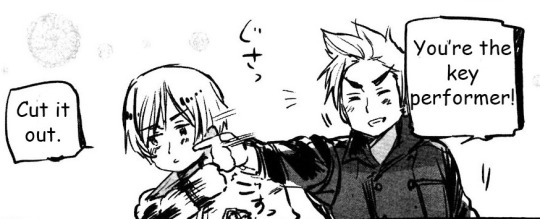
one thing that's a personal pet peeve is his age, and when he's portrayed as an adult. i've seen people saying that they don't even know if he's meant to be a teenager or not! but:
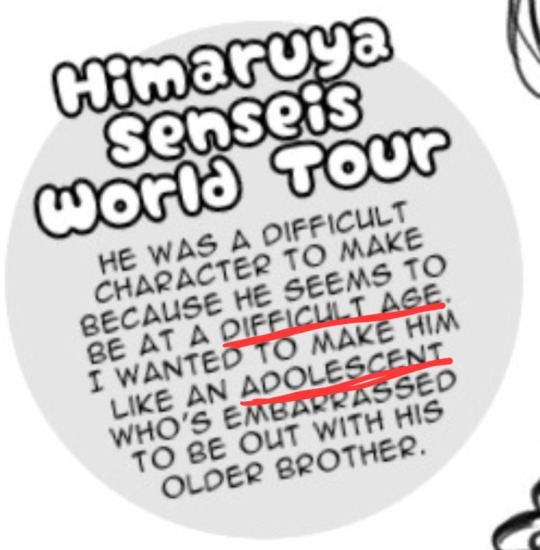
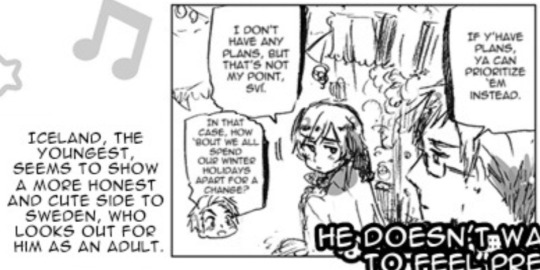
he's meant to be 16-17, as hima has said! now, i think it's fine to take creative liberties with most characters' ages. however, with iceland it's such a core element of his personality that aging him up just,, entirely changes him as a character!
iceland is meant to be a teenager. no, not in the emo tumblr user who loves memes sense (that interpretation was 90% of iceland content in 2015 haha), but like a teenager who because of his age can be immature, and struggle with his emotions, connections to others, and a lot of insecurity. you can see some of that insecurity in his need to be seen as mature, but also his embarrassment over his accent & being hot-headed (another aspect of him that's underexplored! people forget that side of him!)
"According to Himaruya (in a Comic Birz interview), Iceland tends to feel uncomfortable with his thick accent and hard to understand language, opting to speak in English when he can. This was further instated when it was mentioned in his Volume 5 profile that he tries his best to hide his accent.[17]"


but more specifically, i'd say that iceland's main internal struggle & driving force is his want to connect with and be close to others. but in response to him always been forgotten, being an afterthought, and falling behind, he's put up a front of indifference about it - "i don't care if people don't care about me"

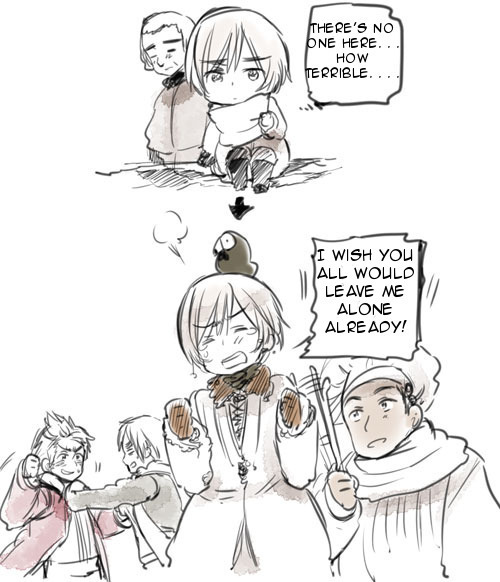


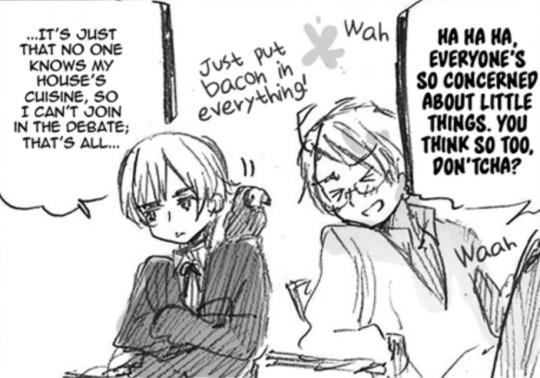

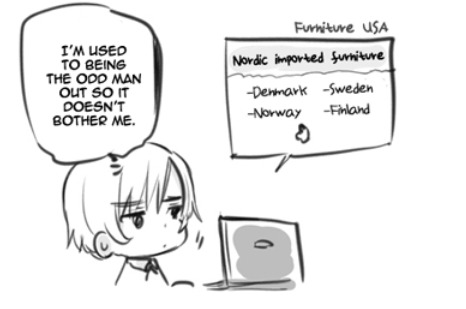
but here's the thing! although he tries to act uncaring and fine being alone, he loves his overbearing family :,) and values the connections they give him so much!! in my opinion, him disliking how the other nordics act is just a front (except when he's being babied, which is understandable haha) and i think this gets kinda lost in fanon. just look at these interactions! (image order is left to right)




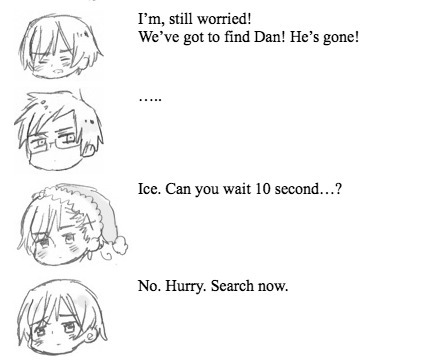
this one below makes me especially sad :,)
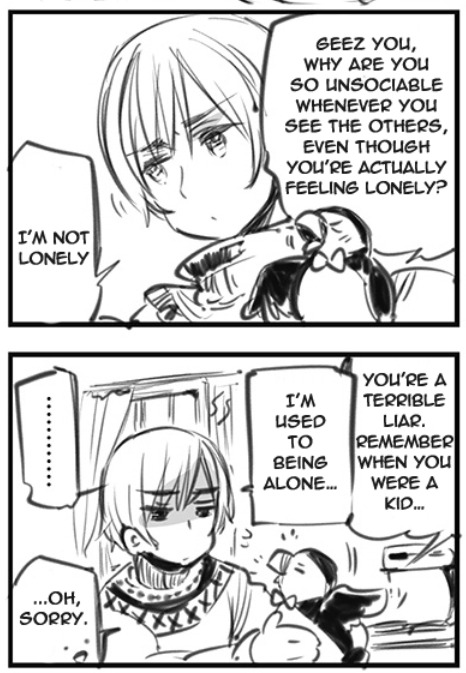

the other nordics being what stops him from being lonely is huge when you consider iceland's origins:




he was all alone, for years and years and years, with no one like himself to explain to him who he was, what he was, a little kid all alone and he was so lonely. that is, until his big brothers finally came over to his island to bring him home!

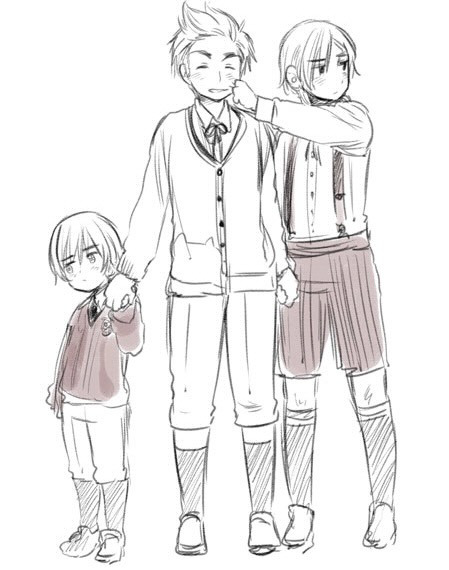
so yes, iceland does care about his family and does want them close, and he's not as indifferent to everything as he wants to act. he's a character with some deeply rooted insecurities, and he feels the need to hide them
and some quick thoughts: i don't have a lot of obvious examples, but iceland is an old-fashioned person! he's not as in touch with the rest of the world, he wears grandpa sweaters and cravats, he has an old ass phone, he doesn't at all strike me as internet savvy and i don't like that characterization of him

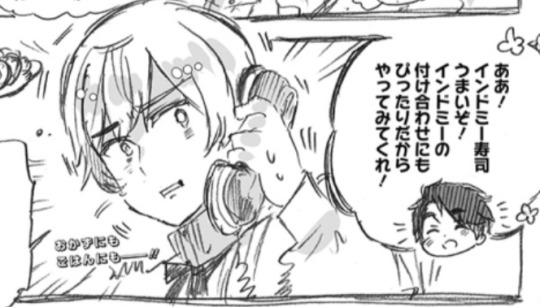
i've covered this in more detail with my denmark & norway rants, but he's super close to both of them, likes both of them, and sees both of them as brothers! in fact, he sees sweden & finland as brothers too!

(+ that image i showed earlier saying that he looks up to sweden as an adult, and how he calls them all nicknames! dan, svi, fin, nor!)
one last thing about his relationships!! people seem to think that him and hong kong are an entirely fanon thing, when actually they have at least 2 manga chapters where they interact and seem to be friendly! here's one of them :)
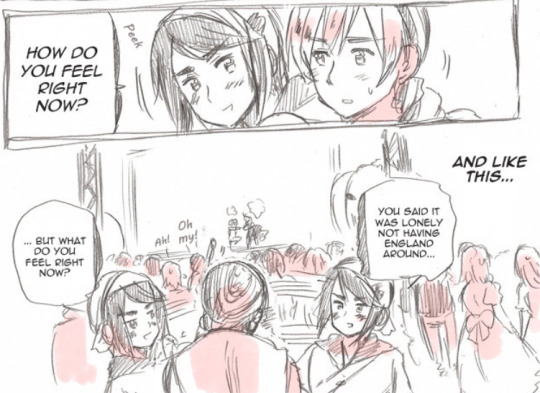
i hope you found this long rant interesting, he's one of my favourites!
#again sorry i cant put this under a cut i would if i could#AND SORRY THIS TOOK ME SO LONG i have no excuses i just got lazy and didnt feel like looking for the manga panels haha#but i got another ask about iceland which reminded me to finish this!!#maia talks#hws iceland#long post#ask
74 notes
·
View notes
Text
Furiosa PSA 1/?
Been seeing a lot of misinterpretation and misinformation with regards to Furiosa, so I wanted to address just a few things I've seen going around in one place that people on here can easily refer to.
Is Furiosa replacing Max as the focus of the franchise going forward?
No. Furiosa is a prequel that's been in the works since it was originally conceived of as an anime in the 2000s until that eventually fell through. There will be no shift towards her character being the singular focus of the franchise.
Why didn't we just get a sequel with Max?
There is at least one Max story, The Wasteland, that is planned to be turned into a future project after Furiosa. It will take place between Furiosa and Fury Road. Miller just wanted to tell Furiosa's story first.
Why aren't we seeing any sign of Tom Hardy?
Despite the fact that Max may be showing up in Furiosa in some capacity, not to mention the fact that the character will obviously be the focus of the The Wasteland, Tom Hardy is likely not returning to play Max. This is in part due to his behavior on the set of Fury Road which has left Miller and co. unlikely to work with him again. He did sign on for two other projects, but at this point his reappearance is incredibly doubtful.
Who will play Max going forward?
At this point we don't know who will be carrying on the mantle of Max Rockatansky, but once we get to production on The Wasteland we'll undoubtedly get some answers. Miller is an unconventional storyteller, and so a James Bond approach to Max himself seems probable, with different actors portraying the same individual across various media.
Given that Furiosa takes place 45 years after The Fall, is Max the Feral Kid?
No. Max is the same person from the original trilogy.
Is George Miller riding the modern wave of doing prequels, reboots, etc. in order to cash in on a character that people loved in Fury Road?
Fury Road was the result of two decades of development from George Miller's initial idea of the story while standing on a sidewalk in 1996. After the initial version of the film which was supposed to star Mel Gibson as an older version of Max (to tie more directly into the period of time after Beyond Thunderdome) fell through due to the Iraq War and financial struggles, the surrounding lore of Fury Road was expanded significantly. This resulted in the creation of two other scripts which became the basis for Furiosa and The Wasteland, respectively. Taken together, Furiosa, The Wasteland, and Fury Road represent one singular trilogy tying Miller's modern iteration of Mad Max together. As a result, Furiosa is hardly some unrelated prequel banking on modern perceptions of how much people liked Furiosa-it was simply a story that was always meant to be told. The same goes for The Wasteland, which is the second chapter in what can be considered the "Fury Road Trilogy." The Wasteland itself was meant to be a video game developed as a collaboration between George Miller and Cory Barlog (the man behind the modern God Of War games), but this was something that never happened. Instead, Avalanche Studios released a game in 2015 which liberally borrowed from Miller's mythos in ways that he expressly did not want them to. As a result he distanced himself from the project and has disavowed his connection to it. It appears that there is now talk of turning The Wasteland into a TV show, but we'll have to wait and see for more confirmation on this.
Why aren't we getting Charlize Theron in Furiosa?
George Miller didn't want to use de-aging tech on this film because he thought it wasn't convincing enough.
Immortan Joe and co.?
We will be getting a good bit of a younger Immortan Joe, although to my knowledge it's still uncertain as to who's playing him. His conflict with Dementus is going to play a key role in the story of the film. Nathan Jones will be returning as Rictus Erectus, along with Angus Sampson as the Organic Mechanic. Quentin Kenihan obviously couldn't reprise his role as Corpus Colossus due to the fact that he unfortunately passed away in 2018.
Is the pacing/storytelling going to be similar to Fury Road?
Furiosa is a movie that takes place over the course of 15 years and involving multiple road wars and various other events which is going to make its storytelling significantly different to Fury Road. Whereas that narrative had one large chase stringing together all of its components, Furiosa will be vastly larger in scale and scope.
#May do more of these if I think the need arises#Just trying to address some things I've seen people talking about#Furiosa#Furiosa 2024#Mad Max#MM#Fury Road#MMFR#George Miller#Furiosa: A Mad Max Saga#Mad Max Franchise#Immortan Joe#Dr. Dementus#Dementus#Imperator Furiosa
40 notes
·
View notes
Note
I urgh, made a reblog earlier on your post about The Shallow Sea, asked a question there which you might have seen and then accidentally deleted it (oops!)
Anyway I wanted to ask do you think the fanus’s struggle for equality will be involved somehow in salem’s villian-to-hero arc? Because fanus and salem (and grimm) are just so heavily connected. She actually had a very great chance with sienna but unfortunately adam killed her.
And also if you could elaborate this salem being the god of animals thing, did she actually created fanus or it’s more about symbolic connection?
An additional note which’s just something I found very interesting. In the opening of v6, adam appears as the leader of white fang while the song goes ‘the river knows to reach the sea’. Besides the chronological order goes cinder-adam-the rest of salem’s force. (Added that rising is a salem song)
oh i. i think about salem and the faunus and grimm only a normal amount. there's more that i've written on the topic than that (among others, i have a relevant post about tyrian and his worship of salem somewhere but i cannot for the life of me find it) but tumblr, u know.
not directly faunus related but the god of choice post is salient because rwby handles divinity in a very polytheist way, and while the recent alchemy post was just for fun it does also lay out the thematically essential death/resurrection element of salem's immortality with more clarity.
(my other mythology tin hat is that salem was the original inspiration for 'the warrior in the woods') (<- tangent).
TL;DR: i think she is the literal, though possibly indirect, creator of the faunus (through her combination of human + grimm into own being; the faunus descend from this harmony of opposites in some way) and that at some point in history, she belonged to faunus civilization and the mythical figure of the 'god of animals' arose through a combination of worship of salem herself + stories she told about the brothers in relation to her transformations.
(notice that the god of animals in 'the shallow sea' resembles darkness in character, and the one in 'the judgment of faunus' resembles light, but both versions are also unrecognizable as the brothers because they interact with their chosen people in a reciprocal manner—faunus choose to be changed in both stories. where ozma uses myth to guide humans toward what his god wants them to be, salem used myth to uphold her idea of what the brothers should have been and what kind of gods deserve reverence.)
the narrative has not ever been shy about making symbolic connections between the faunus and the grimm—like, blake reveals her ears for the first time whilst gazing at and identifying herself with the beowolf trampled underfoot by human huntsmen in beacon's statue. the white fang wear grimm masks because "humans wanted to make monsters of us, so we chose to don the faces of monsters." qrow in the faunus WOR episode more or less explicitly describes faunus as in-between humans and grimm.
(<- which is not necessarily accurate because qrow's narration is chock full of obvious subconscious bias—to the point of straight up saying "honestly, it's not too hard to sympathize" with the perspectives of humans who hunted down the faunus like animals because "seeing something that looks like you and acts like you walk out of a forest and reveal a pair of fangs can be… upsetting" and in no way are we meant to take that as an objective statement; in V1 weiss is unambiguously portrayed as the one in the wrong for hating faunus on the grounds that the white fang is at war with her family's company, a reason that is a lot less shaky than "fangs are upsetting" and yet is (properly) framed as irrational and bigoted.
but qrow's perspective is meant to reveal cultural attitudes, not objective facts, and his overt placement of faunus between humans and grimm is interesting in the context of everything else the narrative does to draw a connection between faunus and grimm)
salem is "your grace" to her followers and ghira is "your grace" as the chieftain of kuo kuana, implying that salem might outright self-identify as a faunus. she wants to secure sienna khan's alliance (<- a genuine activist) and drops adam (<- a terrorist) like a hot potato after he murders her, she explicitly has no plans to attack menagerie, and menagerie doesn't… seem to have a grimm problem… like at all. zero grimm attacks in kuo kuana across two volumes there and not a single character in menagerie mentions them as a problem.
so rwby is not exactly being subtle.
generally, i do not think the heavy emphasis put on the white fang arc was solely being overambitious about doing a Racism Subplot; i don't think it's coincidental that the narrative completed the white fang arc and then immediately launched the "salem backstory" arc with the lost fable. the white fang arc sets up for the lost fable and salem's arc is inextricable from the faunus-persecution narrative because she, in every way that matters, IS a faunus herself.
and i think that is very much going to eventuate in V10+ yeah. it's already beginning to—the affirmation of jabber's personhood and overt sympathy afforded to neo and the cat, in tandem with blake's arc in V9 being toward vocally embracing and taking pride in being a faunus as the culmination of her journey out of shame in V1-6 and quiet figuring-herself-out in V7-8, points strongly in that direction.
25 notes
·
View notes
Text
IIt’s a crazy bold move for Matt Johnson to play pretty much the same character as the one he plays in Nirvanna the Band the Show (which in turn is based on himself) in The Dirties, a movie where he plays a SCHOOL SHOOTER.
TBH I ended up relating a lot to Matt’s character, so much so that I ended up frantically searching up if my thought patterns are “normal” (at one point in the film Owen admonishes Matt for “always acting” and “always being conscious of yourself” and that’s like the curse afflicted by autism masking innit?). But relating to the characters even though you know they’re gonna commit unspeakable violence is kinda the point of the movie, yeah? It maps pretty closely to a classical tragedy, doesn’t it? The whole thinking to myself “He isn’t really gonna do it! He can’t! He’s too much like me! He’ll get help!” but he does do it, and I knew he would because I read the blurb of the movie.
I guess there is something to be said about how autistic traits are often used as shorthand for someone being creepy, violent, or dangerous. Always “acting,” socially isolated, unable to connect with peers, only communicating with others through the lens of an “obsession,” strange body language, dressing strangely, being socially and developmentally “behind” their peers…
During my school days the shy quiet kids that did nothing but get their work done and go home were often called ‘school shooters’ behind their backs. It's a strange feeling knowing that people would probably say the same thing about me if only I fit the profile a bit better.
Something else about the movie obsession as well and wanting to make a movie that is “real” speaks to me as well.
Well first that is another bit of strange self awareness by the director. Matt Johnson has said that early in his career he only wanted to film “real life” because people who do not know they are being filmed make the best actors. That’s why many of his projects use the real reactions of the public and loose scripts for characters to fill with improv! Maybe if he was more fucked up he would be more like Matt (the character)....
(Of course we could probably sit here and name many directors who turned abusive on set to capture “realness,” though none of them used the public!)
It’s easy why as a kid I picked up what was shown in movies and TV as being the “ideal.” I guess that’s normal, how things are portrayed in movies is an endless discussion that affects how people think. People like to romanticize their life as if it was a movie. But it’s different for me in some ways, most people don’t take movies and TV as gospel on how to communicate with other people. It’s one of the questions on the CAT-Q after all. Once in high school, I said about some event (don’t remember what) happening “feeling just like it does in high schools on TV.” My friend gave me a funny look and asked what I meant by that.
At the bonfire Matt describes his “cake plan” to a girl with a tone best described as “oblivious to her disinterest.” The girl responds that it’s probably not a good idea, it’s too over the top and it’s something that would happen in a movie, it wouldn’t work in real life. Matt responds with “Yeah, but what happens in movies works…”
Zooming out a bit I think there is something to be said about many Matt characters (the Dirties, NTBTS, Matt and Bird Break Loose, and Operation Avalanche to an extent) relying heavily on “plans.” Matt in the Dirties helps Owen concoct plans in order to win over Chrissy, and writes down a shooting schedule in much more detail than is probably expected for a school project. (I think Matt’s plans for Owen are supposed to be a parallel to the type of thorough planning needed for making movies, which is a bit ironic considering the loose improved shooting of the ACTUAL movie). Matt in NTBTS is constantly making plans in order to get a show at the Rivoli and often gets frustrated with Jay when he doesn’t follow through with plans or tries to change them halfway. This culminates in a scene in the final episode in season 2 where, stuck on a roof, Matt uses spray paint to write out a new numbered plan on a wall (a plan that only involves breaking the AC unit and then waiting for the repair person to arrive to sneak out the locked door). Almost as if he can’t possibly keep a plan straight in his head without it being concretely written down. When I opened commissions for the first time last summer I was so stressed that I wrote a detailed planning sheet in order to predict how every interaction would go. Only by writing it down did this plan feel real.
But going back through some interviews I was surprised to learn how much Matt Johnson (the character in the Dirties) is based on Matt Johnson’s (the director) actual experience in high school (the sweatpants story was real!!). I guess it’s just weird to watch a movie that is empathetic towards the school shooter (while still accurately capturing the horror of violence)! One of things that inspired him to make this movie was how ascribing “evil” to someone ends conversations, strips people of their humanity. It’s scary to think about how anyone is theoretically capable of doing this, how it could be us as well. It’s not uncommon for autism (or previously aspergers) to be pointed at by the news media as a “reason” for why people do these things.
Towards the end of the film Matt reads the definition of a psychopath from Dave Cullen’s Columbine book. (Paraphrasing here) Emotions, body language, facial expressions, and voice modulations can all be mimicked on cue. His life is a con, a personality fabricated with the purpose of deceiving people. Matt turns to Owen and asks him if that reminds him of anyone.
#the dirties#my The Dirties autism analysis essay#I really liked this movie! I thought it was really good! If you're in the US you can watch it free on Plex rn! No account needed!#maybe other places too#I'm always unsure when recommending movies like this if I should mention the poorly aged/problematic things#Like the liberal use of the f slur and r slur and the brief shot of blackface that goes commented on (?????)#like is mentioning that necessary? I don't know
19 notes
·
View notes
Text
Behind the Mask: Character, Past, Memories, Idea

Oh boy, this is a big one. We already know that 'Sparkle' is not her real name, but with how much its used predominantly that it might as well be her real name at this point. But this also poses the question. Which 'Sparkle' is real? As her Myriad Celestia trailer states in the end, "Who's the real Sparkle?"
The answer might either be 'Every Sparkle is real', or 'Every Sparkle is not real'.
Confusing, yes. But it actually has weight to it.
To Sparkle, the name and character of 'Sparkle' is an idea. And ideas are unkillable. Ideas are eternal. The one acting the character may die one day, but the idea of the character will transcend and far outlive them, thus becoming a legacy.
Though of course, Sparkle isn't doing this to please the crowd, or to gain clout. She simply does so for the sake of enjoying oneself. Fame? Money? Power? Success? It doesn't matter if she'd have them, or she'd end up having only less. What matters most is the entertainment and joy she derives from doing so. Sure, she wouldn't admit that she does yearn to noticed by others, but that's just something inherent on every actor after all.
Her Character Story Part IV has a good insight on this idea, on what the character Sparkle means to her, and the purpose of her acting and weaving stories, in general. On how important narrative is to her.
But how does this connect to Past and Memories?
Simple.
The mind can be trained. It can be trained in surprisingly bizarre ways that one can find haunting, and self-destructive to some.
You can train the mind into a pavlovian response. You can train the mind with hypnotic triggers. You can train the mind in simple memorization. The mind is constantly exposed to external stimuli that it learns and can be trained in the most random of ways.
Again, how does this correlate?
As stated on a previous Headcanon post, "In a narrative sense and her penchant of impersonation and the countless, different iterations of her origin, Sparkle effectively embodied this narrative. The concept of story telling of a “Hero’s journey”, narrating multiple starting points, middle points and endpoints of various outcomes she had thought for herself, to the point that every story she claims to be her origin story becomes a red herring meant not only to misdirect, but to also be open to multiple interpretations and suspension of one’s disbelief in order to acclimate themselves to what story they should believe in."
Funnily enough, this is supported by what she says on her Character Story IV:
"Liking and believing are two different things, but people are more likely to believe in their favorite stories."
"Lies? Come on, I'm not trying to tell a grand story or fabricate an eye-catching experience… I'm wholeheartedly exercising my imagination for my own sake. I imagine various lives, seek excitement, and then recreate them as best I can, and pump the brakes on my imaginative balloon just a second before it bursts."
"Seriously, having a script is far from enough. First and foremost, I must wholeheartedly believe that the character I'm portraying truly exists. Then, I need to imagine the other stories where the character would appear. I always need extra information to make their motivation logical and emotional."
Sure, one can have derive a reading from this that Sparkle is simply sharing how her creative process works, and that's completely valid. Creative process and narratives always come hand in hand, after all. However, I would like to add an additional reading to this.
By wholeheartedly believing the the character she's portraying truly exists, this also means that she would have to believe that said character's experiences and memories would be inherently real.
Thus, this alone also connects to the 'Past' and 'Memories' bit I have suggested onto the title of this headcanon post.
I think Sparkle's expertise in narrative is more than enough to fool even a Memokeeper.
By wholeheartedly believing the characters she portray in her 'origin stories' truly exist, as well as recreating those various lives as best she can, she is able to create memories that are so pristine and real, that it can completely fool anyone, or almost anyone, save for the people who truly know her in a personal level.
How is this possible, you say?
Simple.
As stated above, and to requote it, "The mind can be trained. It can be trained in surprisingly bizarre ways that one can find haunting, and self-destructive to some. You can train the mind into a pavlovian response. You can train the mind with hypnotic triggers. You can train the mind in simple memorization. The mind is constantly exposed to external stimuli, be it from others, or from oneself that it learns and can be trained in the most random of ways, be it a net positive or a negative."
Along with that is Sparkle's penchant for method acting.
In fact, this always seem to be Sparkle's go to in regards to acting.
Again, to quote her Character Story IV, "I must wholeheartedly believe that the character I'm portraying truly exists. Then, I need to imagine the other stories where the character would appear. I always need extra information to make their motivation logical and emotional."
But Eris, how can you be so sure that she's indeed a practitioner of method acting?
Its right there.
The need to wholeheartedly believe that the character she's portraying truly exists without a shadow of a doubt, as well as recreating the lives of said character to the best of her ability.
Not to mention, she also says this:
"-what I'm trying to convey is that in such an environment, who but myself can guarantee that I won't stray from my intended path and become a character in someone else's story? Nobody! That's why I have to tirelessly imagine and immerse myself in the act."
"No, I'm not denying it… It's truly addictive to me. The more I imagine, the more I get absorbed in those characters, the wonderful and tragic situations I create for them, and the emotions they experience in those circumstances…"
Not to mention the full, wholehearted willful immersion of oneself in portraying these different Sparkles from her different origin stories.
This is also why she impersonates. In fact, she can impersonate anyone so well, down to the personal level, that only thing limiting her into perfectly passing off as someone else would be foreknowledge and memories. If she is given enough time to fully understand and study another person, then her impersonations would be indiscernible to a haunting degree.
But of course, simple immersion just won't cut it, right?
Here is where self-hypnosis lies as a factor.
I believe that through her Elation powers, Sparkle is able to frequently use some form of hypnotherapy onto herself to either alter, omit, create, or outright suppress memories as if they never even existed. This way, she can train her own mind to truly believe that not only her 'origin stories' are real, but also the experiences and memories from them as well.
But Eris, wouldn't that veer off to a Memokeeper ability already? Sure, Memokeepers already inherently do that on the daily on other people, but the stark difference here is that Sparkle can only do it on herself.
But Eris, shouldn't Memokeepers be able to easily sniff that out?
Sure, they can possibly do that. But Emanators aren't ordinary Pathstriders, are they? Much like how diving too deep in a certain implied Self-Annihilator's memories would take the turn for the absolute worst, trying to pry too deep into Sparkle's mind and memories would only result to psychedelic madness. A massive jigsaw puzzle where every piece don't seem to fit right. A grand house of mirrors, wherein everything is both real and not real at once. A maze that constantly shifts. A liminal space that just goes on and on in sheer maddening randomness.
Again, the mind can be trained. And once it is trained well enough, even fantasy becomes reality. Even fiction becomes fact. Even stories become true events.
The mind can be trained not only to fool others, but also to fool oneself.
This also runs back to another previous Headcanon regarding to the Self. This is the product of the unionizing between Sparkle's conscious and unconscious. This is the Masked Fool's personalized 'perfection'.
An individual who embodies the idea of the Thousand Faces. An individual who doesn't really care about status, wealth or power, but of one's own personal joys and elation.
Hence with such mentality, Sparkle is unbound. Unbound from any limitations, unbound from any constraint. She will go where she pleases, and will do what she sees fit, for the gratification of the self.
"If you want to perform, is there a stage more captivating than your own life?"
Thus, this is the idea of the character Sparkle. The refraction of light on a prism that shines in so many different colors, with each color just as real as the the main light source that had refracted from the prism itself.
Or maybe said refractions are just the trick of the light, and none of them are real?
It all lies on the eye of the beholder.
8 notes
·
View notes
Note
penny for your thoughts regarding the fatui, how they're portrayed and how you'd adjust them?
thank u…. every penny counts…
I find the Fatui pretty frustrating, honestly. The Harbingers are difficult to get invested in - I find their lore overly complicated and tedious, their storylines don't use the characters effectively and lack punch, they're no fun as villains and - worst of all - their boss battles suuuuuck. I think Childe and Dottore get off the best of all of them, and when Dottore's Biggest Moment so far is when killed off all his clones off-screen when we barely got to see him utilise him that's… not… great.
(memorable boss battles are important for memorable antagonists, and action RPGs. HYV has very bad sense for when they should include bosses - or has crippled itself with its mat boss/trounce domain system - and relies on spectacle over fun and challenging boss fights.)
IMO, HYV dug it's own grave when it decided Genshin needed minimum 2 separate villain factions, the Celestia mystery AND all the regional lore… on top of also needing to seed several brand new characters that are all going to be likeable charming allies that are literally going to be products. That's a lot to cover and not a lot of time, especially when they're so averse to having characters be relevant to each other on-screen for extended periods of time. And you don't want loads of dialogue in a videogame anyway...
Anyway, not fun. I like kooky villain squads but the Harbingers just ain't it, chief.
As for my plans, assuming you meant the rewrite by 'adjust'...
I've been thinking a lot about how to manage the Fatui. My plans are loosely based around my expectations for how Genshin canon will handle the Harbingers going forward - I think there's going to be a civil war that will divide the 'sympathetic' well-intentioned extremists/playable Fatui (Tsaritsa) and the 'unsympathetic' irredeemable villains/non-playable Fatui (Jester/Pierrot), and the two sides will come to blows (the Traveler siding with the Tsaritsa in some capacity). Genshin loves its factions.
I plan to stick to the rough shape of that, though I want to cut as much bloat as possible;
Jester's Faction will be connected to/allied with the Abyss Order. Pierro wants to restore it, destroy the modern world and overthrow Celestia.
Tsaritsa's Faction also wants to rebel against Celestia to free humanity, but the ends justify the means as far as she's concerned. She will still be a villain, but she'll be the 'lesser evil' compared to the Abyss Order and Celestia. I imagine her gracefully entrusting the world to the Travelers once her plan is foiled.
I'm going to make the Harbingers from each region more relevant to the overarching plot, but I'm going to focus on some more than others. Some one-off bosses, some will be connected to the party.
I'm going to cull a lot of unnecessary lore, or reassign some elsewhere. I really only want to keep what's necessary. I might even merge some Harbingers with other characters to streamline things - e.g., I'm probably just going to upgrade Pierro's relevance by making him one of the 5 Sinners of Khaenri'ah, or merge Enjou with one of the Harbingers.
It's easier to plan for the Harbingers I've already seen than the ones I haven't, haha... I do have some specific plans in mind, though.
Childe is easiest to discuss; he's loyal to the Tsaritsa and is a sometimes-enemy-sometimes-ally to the Travelers + rival to Lumine. He's my tentative pick for the party member that joins in Snezhnaya, likely on the Tsaritsa's orders after she's defeated. I want him to get stronger alongside the party - like Lumine, who has to start caring about Teyvat/only cares about finding Aether and bouncing, Childe will also grow into a more responsible person and leader/only cares about FIGHTING. (@ the arlecchino stuff down below)
La Signora - she's vindictive, hates Mondstadt specifically and has an axe to grind with Venti. She'd be defeated in the second Mondstadt arc, not Inazuma. I think the idea of reversing time to redo the war against the surface/Celestia is very appealing to her, so she falls in with Jester. She doesn't give a shit about anyone else - she just wants to save Rostam.
Arlecchino - To cut down on redundancy, I'm going to merge Peruere with Crucabena as the cold and uncaring head of the House of the Hearth. Lyney would kill her during the events of the Fontaine AQ and take her place as Arlecchino. I'm a bit torn on Peruere's loyalties; on one hand, I'd like to use the Crimson Dynasty stuff re; the way she raises the kids in the House of the Hearth, on the other I think this is a great place to put the Tsaritsa's "ends justify the means" ideology to greatest use. Childe will probably end up stepping up quite a bit here.
Scaramouche - a piece of Kazuha's character arc; these two will be developing around each other quite a bit. The "become god" plan will stick around from canon, but I plan to end Sumeru with him going on the run from both the Fatui and Celestia with the Electro Gnosis in his possession. He'll show up (much) later as an ally, though he won't join the party.
Dottore - Team Jester. is just here because this entire venture sounds fascinating and he wants in. For science. I like the idea of being able to fight and kill him multiple times. I'll be positioning him more as an enemy to Collei and by extension Nahida than Scaramouche, bc when I said I was simplifying lore on GOD Scara is gonna be one of them. I have got to figure out what I'm doing with Irminsil...
I need a Harbinger aligned with the Abyss to swing a bat at Zhongli to kick off the "Zhongli Dies For Real" storyline later in the game that's going to seriously fuck up Xiao, and my current prospect is Pantalone. I'm seriously considering chopping up Enjou's narrative role between Childe and Pantalone. It'll either be Pantalone or Sandrone anyway, though I'm really not a fan of the "Sandrone is Guizhong!" theory.
At the very least, Kathryne will be Sandrone's eyes and ears.
Capitano - Tsaritsa Faction. I... don't have much, he's really uncompelling. I'm debating cutting him from Natlan and moving him somewhere else, I really gotta see 5.3 first. Might be cool if Dainsleif was his commanding officer back in the day?
Man, Mondstadt, Inazuma and Sumeru are the easy ones. Liyue, Fontaine and Natlan are gonna be.... ugh.
I have my own plans for Celestia if we don't get anything from HYV any time soon (or if I don't just like it), so the specifics regarding the Tsaritsa will have to wait...
4 notes
·
View notes
Text
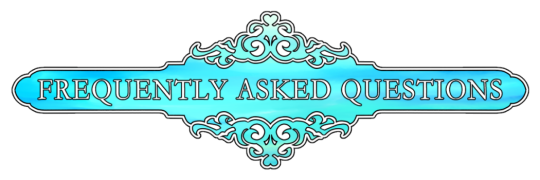
What is all this about?
Sephesis Week is an annual event to encourage the creation of works centered on pairing Sephiroth and Genesis Rhapsodos of Final Fantasy VII, a ship referred to throughout the fandom as Sephesis, SephGen, or GenSeph. This is an unofficial fan-run event and is neither representative of nor in affiliation with Square Enix Holdings Co., Ltd., Tetsuya Nomura, Gackt, or any entities legally connected to the Compilation of Final Fantasy VII.
What's the deal with the prompts?
There are a total of three prompts for any given day of the event, each following the same general concept from different perspectives. The two core prompts are single words, while the alternate prompt is a short canon-relevant phrase meant for creators who don't feel particularly inspired by single word prompts. You are free to use any prompt in any order or combination; you can use either (or both) core prompts one day, then an alternate prompt the next, or any other combination thereof.
Who can participate?
Anyone who wants to! Literally—although this comes with the caveat that participants or entries that violate the event guidelines will not be reblogged to the event account or added to the Archive collection.
Just because you won't get a reblog doesn't mean you can't participate! The guidelines are designed to keep the official Sephesis Week page(s) safe and accessible to all audiences, but the event itself is open to all regardless.
What do I get for participating?
This is a no-profit, voluntary event; participation is meant to be a matter of celebration and appreciation.
As a thank-you for participation, a set of digital "badges" featuring custom artwork was offered at the end of Sephesis Week 2024. These may be returning for 2025, but this presently can't be confirmed.
What kind of work is allowed?
Sephesis Week accepts fanworks of any kind and any rating that don't violate the event guidelines. The event does not accept gifsets, moodboards, fanmixes, screenshots, official art, anything machine generated, or work that has been traced or copied from another source not created by the participant. Work hosted offsite must not be paywalled or locked behind a privacy filter.
Fanart, fanfiction, cosplay photos and most other fanworks created by the participant exclusively for the event are accepted. Fan animations and 3D renders are considered fanart, cosplay and custom dolls are considered photography, and poetry and song lyrics are considered fanfiction.
Is there an alternate hosting platform for the kind of NSFW artwork prohibited by tumblr community guidelines?
Pillowfort is recommended for hosting adult visual art! Just drop a non-anonymous ask to be provided* with an invite link. Secondary recommendations include Pixiv and Poipiku, but both require strict adherence to Japanese censorship laws.
Post a censored or cropped version of the piece here on tumblr with a link to the external host, and ping @sephesisweek so it can be reblogged to the event account!
Can other ships be included in our work?
As long as monogamous Sephesis is the main focus of the piece, what goes on around it is open to anything! This means that you can have any other characters dating in the background or having unrequited feelings for someone in the main ship, but neither Sephiroth nor Genesis should be portrayed as in a relationship with them. This means Genesis and Angeal seeing each other on the side in the present tense shouldn't be included (unless they're breaking up or there's some other mitigating circumstance), but Genesis and Angeal having seen each other in the past or Angeal having unrequited feelings for Genesis in the present is fine.
For a highly specific note that's necessary based on the prevalence of this in the fandom, if your work is explicit and you don't consider it AGS because Angeal doesn't take part in the explicit portion of the piece, but is referred to or indicated to be in a relationship with either Sephiroth or Genesis outside the context of that scene, that is still AGS and is not permitted for the event. "Ship" is shortened from "relationship," not an acronym for "Sex Had In Proximity."
What does it mean to post something publicly versus non-publicly?
It’s quite common for participants in fan week events to finish prompt fills in advance of the event itself. Posting behind a paywall on a platform like Patreon or Ko-Fi and sharing work with friends in a private server is not considered posting publicly. Sharing snippets of works-in-progress is also fine, since the guideline applies to finished work specifically.
What does "characters must be recognizable" mean in reference to AUs?
Alternate universe renditions of characters are allowed and encouraged. However, if the alternate universe in question features Genesis recast as a white cisgender woman with brown eyes and blonde hair who answers exclusively to the nickname Essie and spends her weekends picketing with the Westboro Baptist Church, the character is no longer recognizable. Obviously this is an extreme example, but hopefully clarifies the rule a little better.
My work wasn't reblogged to the event account!
Oh no! There's always a chance of things slipping through the cracks with events like these, so if this happens to you please reach out! While it's likely that your work is in the queue, it's also possible that it didn't show up in the tag search, that the event account wasn't properly pinged, or that the post or work violated the event guidelines in some way. Drop an ask with a link to your post and we'll figure it out!
I saw someone bashing a character or ship in their work for the event.
First, keep in mind that criticism of a character or ship is not equivocal to bashing. Saying or illustration unpleasant things about a character or ship is not necessarily bashing. Context and intent is important.
Likewise, actually bashing a character in blog posts not meant for the event is absolutely not considered a violation of the event guidelines. Sephesis Week has neither the time nor the energy to police people for being nasty about a fictional character outside the bounds of the event.
If something was reblogged to the event account that you genuinely believe constitutes bashing, drop a non-anonymous ask with a link to the piece in question and an explanation of your reasoning, and it will be reviewed as soon as possible. Anonymous asks used to report content will be ignored, and any reports deemed malicious will result in the reporter being permanently blacklisted from this and all subsequent and related events.
What if I have "a history" of tracing / copying / something else prohibited in the guidelines, but I don't do those things anymore?
People make mistakes all the time, that doesn't mean they can't change! If you're worried about your work not being reblogged to the event account due to something that happened the past, drop a non-anonymous ask and we'll talk it over. Anonymous asks on this topic will be ignored due to the inability to respond in private.
How do I tag/flag sensitive content?
On the Archive of Our Own, participants must use the Archive's warning labels as is appropriate, with a preference against the "Creator Chose Not To Warn" option. (No one can stop you, but comprehensive warnings would be preferred.) These labels include: "Graphic Depictions Of Violence," "Major Character Death," "Rape/Non-Con," and "Underage." Ratings must also be applied appropriately, ranging from "General Audiences" to "Explicit." See the Archive's guides on ratings and warnings for more information.
All participants should also tag or warn for the following content as applicable:
Genderbending
Body Horror / Medical Horror
Pregnancy
A/B/O Dynamics / Omegaverse
Drug Use
Dubious Consent
BDSM / RACK
Abuse / Undernegotiated Kink
Bloodplay / Scat / Emetophilia / etc.
Ageplay / DDLG / DDLB / etc.
Incest*
Racism / Transphobia / Homophobia / etc.
(This list may be updated over time!)
*Both characters having Jenova cells does not make them related any more than two people contracting the same strain of the flu renders them related. Growing up together does not make two people related. Knowing one another as children does not make two people related. Please only use this tag if it is actually applicable in the context of your work.
This list is considered "boilerplate," assembled from known tropes and content in fandom as a whole, and reflects neither the support nor the opposition of Sephesis Week.
"Dead dove do not eat" is an acceptable tag only in conjunction with other warnings; if this is the only tag used to describe your creation, it will be assumed to exclusively feature deceased and inedible birds and it will not be reblogged to the event account. Likewise, without more detailed qualifiers, "whump" is a sound effect, not a content warning.
For posts hosted natively on tumblr, participants should not violate the community guidelines, are expected to tag their work with warnings in line with those used on the Archive (in order to make it easier for Sephesis Week to apply the right tags when reblogging to the event account), and must apply the correct community filter. Visual work hosted elsewhere and linked from tumblr via thumbnail or censored variant should have any sensitive content warnings applicable to the full version of the piece in tags or the body of the post, whether the tumblr post itself requires a community filter or not.
Sephesis Week welcomes all types of content, but work must be appropriately tagged in order to allow viewers to curate their online experience appropriately!
Does the event account have a tag structure that can be used for blacklisting certain content warnings or viewing specific types of work?
Yes! All rating and content-based tags are listed in this post to make it as easy as possible to filter things on the event account.
Fanworks reblogged to the main event account will be tagged for organization purposes as either #fanart, #fanfiction, or #photography, as well as with the year of the event and the prompt used for the entry. Check the directory for detailed tag reference (when available).
There's a warning missing from your list.
This is to be expected, as the list itself is "boilerplate" and can't possibly cover every single type of content that might warrant tagging in the course of an event like this. To have a tag added to the filter list, please drop an ask!
What does it mean that you encourage cross-posting and self-advertisement?
A lot of events like this discourage participants from linking to their other work or posting their work in places separate from the event host platform—Sephesis Week doesn't believe in that. If you link to your print shop or your Patreon in the body of your post, you'll get reblogged to the event account all the same. If you want to crosspost you work to Xitter or Pillowfort or bluesky, you should do it. You do good work and you deserve to have it showcased!
This is, of course, within reason; link-spamming is prohibited, but doing that will get you blacklisted from tag searches anyway, so maybe just…don't do that? Just in general? For the purposes of Sephesis Week, you should use simple text links in the body of the post. Links to crowdfunding campaigns are prohibited.
Why isn't AGS or AZSGC allowed?
This event has been organized to celebrate Sephiroth and Genesis exclusively. Both Angeal/Genesis/Sephiroth and Crisis Core's big gay polycule have an enormous amount of fanworks dedicated to them, but there's very little overall featuring these two in a strictly monogamous romantic relationship.
I'm not interested in this pairing outside AGS.
That's fine! This event is not for you.
I hate Genesis.
This event is not for you.
I'm pretty sure both of these characters are straight.
Everyone's wrong sometimes! Also, this event is not for you.
Don't Sephiroth and Genesis hate each other?
I am begging you to actually play Crisis Core.
Wasn't there a Sephesis Week a while back? Is this run by the same people?
This event is unaffiliated with lilly-white's SephGen Week 2017 (tumblr tag); Sephesis Week has been organized and managed entirely by getvalentined.
Why do you have so many rules?
In order to make an event where everyone can enjoy themselves without worrying about stumbling over something that puts them off the event altogether, Sephesis Week is run similarly to old-school fandom events back on LiveJournal. This means that there are no limits on the kind of work that is accepted with regard to content, but tags are integral and warnings are required.
…Why does this post say it was made in 2008? Why does the Directory say it was posted in 1992?!
Dates are an illusion; the dates on blog entries, moreso.
Real answer: it keeps them from showing up on followers' dashboards, in searches, or from sitting above actual event entries in the blog view. The date on both this post and on the event guidelines was chosen because it's when Meteorfall happened! The date in 1992…it's relevant to at least one person.
I have a different question!
Awesome! Send in an ask so you can get an answer!
8 notes
·
View notes